








The death toll continues to climb in Haiti as gangs and Haitian authorities clash in attempts to take control of the country.
Around the world supporters and political figures are calling for the violence to cease, as solutions to the many problems facing the country are discussed and agreed upon.
In the United States Black advocates are calling for an answer created for the Haitian people, by the Haitian people.
To further discuss proposed plans for peace and how Black people around the world
can help, the Institute of the Black World: 21st Century convened at the historical AME Metropolitan Church in Washington, D.C. to galvanize U.S. citizens and members of the international community in support of Haiti. Led by Dr. Ron Daniels, the Haiti Support Project has been active over the previous three decades and working to build
a constituency that can work collaboratively with members of the Haitian population.
“We are the premier African-American organization that has worked to address issues in Haiti. Our rally at the historic AME Metropolitan Church is against the backdrop of one of the worst crises in Haiti I have
is founder and CEO of the research and data analytics company, McKinney Gray Analytics. Gray worked with the Democracy and Power Innovation Fund (DPI) to create the report.
“According to my estimates, based on U.S.
their ballot in elections for the U.S. president, delegates in the United States House of Representatives, at-large members of the Council of the District of Columbia and Ward council members from Wards 2, 4, 7 and 8. Voters will also be asked to select United States senators and local party committee members in addition to convention delegates at the request of the eligible parties. Qualified non-citizens can now vote in D.C elections for local offices.
Non-citizens cannot vote for federal offices. Early voting
Census data and on a recent Stanford study, 24.76 million Black and Latino eligible voters are currently missing or listed with incorrect information in voter databases sold by vendors, making them effectively
will begin in the nation’s capital 15 days before the election. All active, registered voters will be sent a no-excuse mail-in ballot for the D.C. primary.
Baltimore:
- Voter registration will close ahead of the primary election on Apr. 23, 2024. It will reopen on May 28 and close ahead of the general election on Oct. 15.
-Mail in ballots must be postmarked on or before the primary election day May 14.
-The primary election will take place on May 14.
Those who are interested in early voting for the general election can cast a ballot between Oct. 24 - Oct. 31.
The general election will be held on Nov. 5 until 7 p.m.
In Baltimore the following positions are up for election: Baltimore City mayor, city council president, city council representatives, one Senate seat and three seats in the U.S. House of Representatives. To vote by mail, you must request a mail-in ballot from the State Board of Elections or your local board. You can register to vote during early voting.
According to the Maryland State Board of Elections, “Effective, March 10, 2016, if you have been convicted of a felony and have completed serving a court-ordered sentence of imprisonment, you are eligible to register to vote. You do not qualify to register to vote if you have
unreachable,” said Gray, in the report’s executive summary. “While 40 percent of Black and Latino people are invisible to voter outreach efforts, only 18 percent of White people are missing or mislisted.”
This information is increasingly critical as the country faces crucial local and national elections this year.
Gray offers several solutions to the problem in the report.
“Philanthropic investments directed at surfacing missing voters will be necessary to increase community-based data collection, support organizational engagement in antiracist modeling and bolster efforts to build better community-based strategies,” said Gray.
She argues that voter


Vaughan Gething won the Welsh Labour Party leadership contest on March 16, and is set to become the first Black leader of Wales’ semiautonomous government.
Gething, the son of a Welsh father and a Zambian mother, will be the first Black leader of a government in the U.K. — and, according to him, of any European country.
“Today, we turn a page in the book of our nation’s history. A history we write together,” Gething said in his victory speech. “Not just because I have the honor of becoming the first Black leader in any European country — but because the generational dial has jumped too.
“I want us to use this moment as a starting point, for a more confident march into the future,” he added.
Gething, who is currently Welsh economy minister, narrowly beat Education Minister Jeremy Miles in a race to replace First Minister Mark Drakeford. Drakeford,
69, announced late last year he would step down once a replacement was chosen.
Gething, 50, won 51.7 percent of the votes cast by members of the party and affiliated trade unions, and Miles 48.3 percent.
Once he is confirmed on March 20 by the Welsh parliament, the Senedd, where Labour is the largest party, Gething will become the fifth first minister since Wales’ national legislature was established in 1999.
Once Gething is in the post, three of the U.K.’s four governments will have non-White leaders.
U.K. Prime Minister Rishi Sunak has Indian heritage, while Scottish First Minister Humza Yousaf was born to a Pakistani family in Britain.
Northern Ireland is led jointly by Michelle O’Neill and Emma Little-Pengelly, meaning that for the first time there are no White male heads of government in the U.K.
Wales, which has a
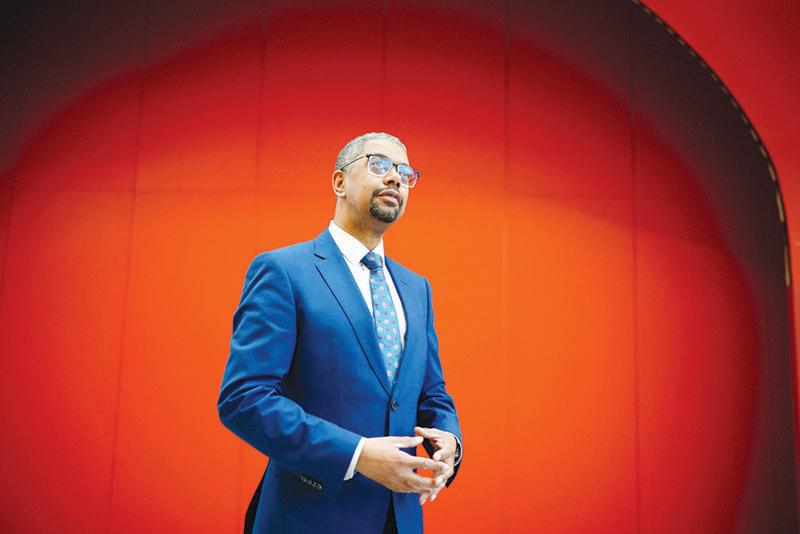
population of about 3 million, is one of four parts of the United Kingdom, along with England, Scotland and Northern Ireland. The British government in London is responsible for defense, foreign affairs and other U.K.wide issues, while




administrations
Gething
economy minister has had to deal with fallout from Tata Steel’s plan to close both blast furnaces at its plant in Port Talbot, eliminating 2,800 jobs at one of Wales’ biggest employers.
He’ll take over a government that is often at odds with Sunak’s Conservative
administration in London. Wales has also seen a wave of protests over environmental rules by farmers, similar to those that have roiled France and other European countries.
Gething was the front-runner to win the contest, though his campaign was rattled by the revelation that he’d accepted 200,000 pounds ($255,000) in donations from a recycling company that was found guilty of environmental offenses and breaching health and

safety regulations.
Gething said that the donations were properly declared under electoral rules.
Other party leaders offered congratulations to Gething, along with a dose of skepticism.
“I daresay it will be business as usual, because he’s been cut of the same cloth as Mark Drakeford,” Welsh Conservative leader Andrew R.T. Davies said. This article was orginally published by The Associated Press


Usher was named entertainer of the year at the 55th annual NAACP Awards on March 16, which highlighted works by entertainers and writers of color.
After Usher accepted his award at the Shrine Auditorium in Los Angeles, the superstar R&B singer spoke about being thankful about the journey of his successful career that has lasted three decades.
He reeled off several of his recent big moments including his sold-out residency in Las Vegas, getting married, releasing his ninth studio album “Coming Home” and his Super Bowl halftime performance, which became the most-watched in the game’s history.
Usher beat out Colman Domingo, Fantasia Barrino, Halle Bailey and Keke Palmer.
“I don’t know how many people do that much stuff in one setting,” said the multiGrammy winner, who was presented the award by Oprah Winfrey. After being surprised by Winfrey’s presence, he thanked those who have supported him throughout the years.
“This is for you, you, my number ones,” the singer said as the audience repeated his words back to him.
The final words of his
speech were recited lyrics from his popular song “Superstar” from his 2024 album “Confessions,” which has sold more than 10 million units in the U.S.
Earlier in the ceremony, Usher was honored with the President’s Award for the singer’s public service achievements through his New Look Foundation. He thanked the strong women in his life, including his mother and wife Jenn Goicoechea, whom he married after his Super Bowl halftime performance last month.
“They say behind or beside or with every strong man is a stronger woman,” he said.
Queen Latifah hosted the awards ceremony aired live on BET.
“The Color Purple” was awarded best motion picture. The musical film featured a star-studded cast, including Barrino, Taraji P. Henson, Domingo, H.E.R., Danielle Brooks, Corey Hawkins and Bailey.
Barrino, who starred as Celie in the film, won for best actress in a motion picture.
“I didn’t prepare a speech, because I didn’t think I was going to win,” the singeractor said. “I was afraid to play Celie, but I’m glad I did. Because I kept saying ‘If I don’t win an award, the awards that I will win will come from the people who watched ‘Color Purple’ and the women who will relate to


her and feel like Oscars when they walk out.’”
New Edition was inducted into the NAACP Image Awards Hall of Fame. The induction is bestowed on individuals who are viewed as pioneers in their respective fields and whose influence shaped their profession.
“We stand here in brotherhood,” said Michael Bivins while his group members behind him. The Grammy-nominated group includes Bobby Brown, Johnny Gill, Ralph Tresvant, Ronnie DeVoe and Ricky Bell.
of Operations
Andrè Draper - 410-554-8200
Director of Finance
Bonnie Deanes - 410-554-8242
Executive Director/Director of Advertising
Lenora Howze - 410-554-8271 - lhowze@afro.com
Director of Community & Public Relations
Diane W. Hocker - 410-554-8243
Managing
Special
-
Editorial
Taylor - 410-554-8257
- Dorothy Boulware - 410-554-8231
Assistant Editor - Ashleigh Fields - 410-554-8200
Editorial Assistant - Ama Brown-Parson
Archivist - Savannah Wood- 410-554-8277
Baltimore Circulation/Distribution Manager
Andrè Draper - 410-554-8200
Production Department - 410-554-8200
Washington Office
1140 3rd Street, N.E., 2nd Floor
Washington, D.C. 20002-6723
202-332-0080 • Fax: 410-554-8213
(Washington Publisher Emerita - Frances L. Murphy II)
Director of Operations - Andrè Draper - 410-554-8200
Customer Service, Home Delivery and Subscriptions: 410-554-8200

observed in the 29 years that we’ve been doing work in Haiti,” Daniels said.
Daniels is a major supporter of a plan for Haiti called “The Montana Accord,” which was first proposed in August of 2021. The Montana Accord is a plan created by the Commission for a Search to a Haitian Solution to the Crisis. The commission is a collection of Haitian advocates from all walks of life– including clergy, politicians and a wide variety of community leaders. The group came together in the aftermath of Moïse’s assassination, which left Haiti without a national leader.
The Montana Accord calls for the country to hold elections while a temporary government is in place. According to the Congressional Research Service, the document lays out a plan for Haitian authorities “restore order, administer elections and create a truth and justice commission to address past human rights violations.”
Internationally known as the first Black free republic in the world, which was once the richest colony and nation in the Western Hemisphere, Haiti is now known as the poorest nation in the hemisphere.
While many people are familiar with the earthquakes that impacted the nation in 2010 and 2018, and more recently, the political instability that has struck the nation since the assassination of Jovenel Moïse, the 43rd president, on July, 7 2021.
Since Moïse’s death, Ariel Henry has served as acting prime minister and acting president of the nation, however Daniels mentioned that Henry was initially expected to serve for a short period of time.
“Henry really was only to stay in
position for about three months. That ended up being extended into almost two years, against the backdrop of people demanding change,” Daniels said.
Under tremendous pressure to resolve the nation’s problems, Henry recently announced his resignation on March 11, 2024.
“Henry really was only to stay in position for about three months. That ended up being extended into almost two years, against the backdrop of people demanding change.”
The U.S. Department of State has issued a level 4 travel advisory for Haiti, and is advising U.S. citizens not to travel to the nation due to high levels of political instability and gang violence.
“Kidnapping is widespread, and victims regularly include U.S. citizens. Kidnappers may use sophisticated planning or take advantage of unplanned opportunities, and even convoys have been attacked,” said the U.S. Department of State, in an alert posted to their official government website.
outreach organizations are currently relying on incomplete data or voter file matching systems that are unable to draw accurate conclusions about large groups of people and need to be more diligent about what they use to connect with voters.
“As our lives continue to skew toward virtual and datadriven reality, it becomes more pressing to address data systems that have proven to be biased against Black and Brown people,” said Gray.
Within the next six months, Gray recommends that organizing and voter engagement groups focus on reaching Black and Brown communities by cleaning up and completing their membership databases and designing programs that use same-day registration.
For donors, she suggests they invest in programs that are targeting and identifying missing voters and ask the programs they invest in how they are locating and appealing to missing voters.
In the long term, Gray recommends that donors and voter engagement groups invest in community oversight of widely used data models, enable anti-racist modeling practices and embrace new metrics to measure their impact on connecting with voters.
“The people unseen by voter files are still capable, if organized, to make moves and wield their latent power,” said Joy Cushman, Senior Advisor to DPI. “People deemed ‘low propensity’ by models and the political industry are defying the odds and still turning out to vote. And many are doing even more than that: they are becoming active members and leaders in power-building organizations, mobilizing their friends and family to vote as well.”
Tashi McQueen is a Report For America corps member.
“But we call each other every day,” he continued. “We text each other every day. We check on our families. You watched us grow up. We’re still growing.”
Damson Idris won best actor in a drama television series for his role in “Snowfall.” Henson and Domingo took home best supporting roles in “The Color Purple.” Domingo also won best actor in a motion picture for his role in “Rustin.”
This article was originally published by The Associated Press.
“You’ve seen our story. You know what we’ve been through,” said Bivins, who spoke about the group overcoming conflict and tension in their earlier years to now holding a residency in Las Vegas.
“Kidnapping cases often involve ransom negotiations and U.S. citizen victims have been physically harmed during kidnappings. Victim’s families have paid thousands of dollars to rescue their family members.”
The state department warned that
“Violent crime, often involving the use of firearms, such as armed robbery, carjackings and kidnappings for ransom that include U.S. citizens are common” in the area.
In the past several months, residents have tried to flee the area as the chaos intensified. However, they have met resistance as bordering countries have closed their borders to flights to and from Haiti. Some of those forced to stay have resorted to fighting back against the gangs that are killing without consequence and pillaging communities.
“Mob killings against presumed criminals have been on the rise since late April [2023],” reported U.S. officials in the travel advisory. “Protests, demonstrations, tire burning, and roadblocks are frequent, unpredictable, and can turn violent. The U.S. government is extremely limited in its ability to provide emergency services to U.S. citizens in Haiti – assistance on site is available only from local authorities–Haitian National Police and ambulance services. Local police generally lack the resources to respond effectively to serious criminal incidents.”
Since the violence began, U.S. officials report “shortages of gasoline, electricity, medicine and medical supplies continue throughout much of Haiti. Public and private medical clinics and hospitals often lack qualified medical staff and even basic medical equipment and resources.”


Should poor people await trial behind bars while the rich go free? In the latest election year culture war, some Republicans say “yes.”
Many Americans haven’t heard of cash bail. But the idea is central to an election year battle over racism, policing and mass incarceration.
When arrested on suspicion of committing a crime, everyone in the United States has the right to due process and to defend themselves in court. But in a cash bail system, when judges set bail amounts, those who cannot pay the full amount remain jailed indefinitely — a clear violation of their due process rights — while the rich can pay their way out of jail.
A 2022 report by the U.S. Commission on Civil Rights examined the impact of cash bail and found that between 1970 and 2015, the number of people jailed before trial increased by a whopping 433 percent.
There are currently about half a million such people stuck in jails across the nation who haven’t been tried or convicted of any crimes. The report also found “stark disparities with regards to race,” with Black and Brown men most often subject to higher bail amounts.
Thankfully, many states and cities are moving to reform this unfair practice.
In 2023, Illinois became
the first state to entirely abolish cash bail. Other states, such as New Mexico, New Jersey, and Kentucky, have almost entirely ended cash bail requirements in recent years. In California, Los Angeles County has also similarly eliminated cash bail for all crimes except the most serious ones.
But in this election year, Republicans are rolling back these efforts — most recently in Georgia.
The state recently passed a bill expanding cash bail for 30 new crimes, some of which appear to be aimed at protesters, such as unlawful assembly. Further, it criminalizes charitable bail funds — and even individuals — that bail out people who can’t afford to bail out themselves.
Marlon Kautz, who runs the Atlanta Solidarity Fund, called cash bail “a loophole” in the criminal justice system, allowing courts to indefinitely jail people if they cannot pay exorbitant bail amounts.
“Police, prosecutors and politicians want a bail system that allows them to punish their political enemies, poor people and people of color without trial,” said Kautz, whose fund has bailed out people protesting a massive new police training facility opponents call “Cop City.” Kautz was one of three people affiliated with the fund to be arrested on apparently politicized charges last year.
Reversing progress on bail
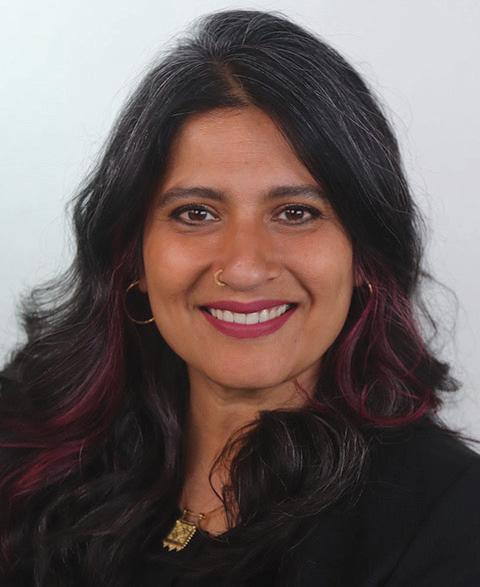
Courtesy photo
Sonali Kolhatkar is the host of “Rising Up With Sonali,” a television and radio show on Free Speech TV and Pacifica stations. This week, she discusses America’s cash bail system.
reform is a new flashpoint in the GOP’s culture wars. “It could be a sign that Republicans intend to bash their Democratic opponents as soft on crime,” the Associated Press reported. Alongside Georgia, Republicans in Indiana, Missouri and Wisconsin have proposed legislaion expanding the use of cash bail.
Expanding the racist criminal justice system is a cynical GOP election-era ploy, one that has little to do with public safety.
“It is exceedingly rare for someone who’s released pretrial to be arrested and accused of a new offense that involves violence against another person,” said Sharlyn Grace, an official at the Cook County Public

Defender’s office in Illinois. “Fears about public safety are in many ways greatly overblown and misplaced.”
“National studies contradict” the claim, the AP adds, that people are any less likely to show up for a court date if they’re released without bail.
Election years are a scary time for people of color in the U.S. They are marked by racebased voter suppression efforts, a rise in racist political rhetoric and even a surge in racist hate crimes. The expansion of cash bail laws is yet another attack on Black and brown communities
— one that must be exposed and confronted. We shouldn’t let reform efforts fall victim to election year politics.
This commentary was originally published by OtherWords.org.
Black churches are a gift to the nation – to keep it going, we need more ‘bigheartedness’By Wale Mafolasire
President Biden recently praised the Black church, saying the world would be a different place without their example. He described the institution as a gift to the nation. And he is absolutely correct.
As an entrepreneur and CEO with a mission to connect people to the causes that matter most to them so they can change their world with kindness and generosity, I’ve spoken with hundreds of pastors. In many of these conversations, I hear a recurring theme: concerns about declining attendance, especially among younger generations, and the ability to attract them. At the annual Conversations Conference last month, which hosted more than 80 of the most influential Black pastors, we dove further into this topic, segueing into
By Derrell FrazierIn
As
succession planning. According to a recent Barna study, about four in 10 Black church pastors say their churches do not have a plan or process in place for a senior pastor succession.
As America’s religious landscape changes and more faith leaders plan for their retirement, research shows the average age is 57, and one in four plan to retire before 2030. We cannot take this gift to our nation for granted. To ensure this gift continues giving, Black faith leaders must engage and inspire younger generations. I believe the answer lies in one word: bigheartedness.
Bigheartedness creates a foundation we can build on While several studies indicate younger generations are leaving organized religion, others show that most young adults still consider themselves religious.
on probation, expanding the number of youth eligible for detention, and expanding the number of 10 to 12-yearolds who can be arrested and detained, effectively undercutting reforms made in 2022. Should the proposals submitted in SB744/HB814 become law, the cumulative effect will be more kids, especially Black and Brown kids, arrested and detainednot safer communities. To get serious about safer communities, we need fewer pathways into the system and more investments in the resources children need to avoid system involvement altogether.
Growing up in East Baltimore, my journey through adolescence was uniquely shaped by the challenges of navigating a tumultuous environment. Raised by my grandmother alongside eight other grandchildren, our household faced the daily struggle of making ends meet and ensuring everyone’s well-
While young Americans are leading the exodus from the church, they’re holding on to their values and they continue to be inspired by and care about causes and social issues like hunger, civic engagement, climate change and racial equity.
We know Black churches have historically played a vital role in empowering Black communities through civic engagement, advancing racial equity, and advocating for social justice. Givelify’s 2024 Giving in Faith report, a collaboration with Lake Institute on Faith and Giving, found that predominantly Black congregations, 42 percent, were significantly more likely to offer services that support engaged citizenship such as voter registration than predominantly White congregations at 9 percent. Predominantly Black congregations were also
being. The sheer weight of these responsibilities made it a formidable task for my grandmother to provide the individual attention and support each of us needed. Instead of systems of support for young people that would have made it easier growing up, my neighborhood was flooded with law enforcement harassment.
As a young Black child, I was constantly stopped and questioned while simply walking to the store to get items for our household. I would be told not to hang outside on the front steps of our home with friends because they felt like we were doing something illegal. Neither my education nor accomplishments mattered to the police because– to them– I was just like every other Black boy whom they saw as a problem child. Not far away, in the South Patterson Park neighborhood, where the socioeconomic makeup is starkly different, young people didn’t face the same police confrontation.
more likely to offer support for social justice movements than predominantly White congregations, with Black churches at 40 percent, compared to 27 percent in White establishments.
Black churches provide a spectrum of social services for unmet community needs, as they are often called upon by their communities to address local poverty, care for the elderly, and confront criminal justice issues. Much of this impactful work is funded by their congregations. And much of this work happens because it comes from the heart. This is a natural connection pastors can nurture.
Bigheartedness is the arc of inspiring stories we can amplify Black churches are and have always been a beacon. I continue to be impressed with
The lack of available community resources needed to alleviate poverty and violence had a direct impact on my own experience with the legal system. My dad was incarcerated, and my mom was criminalized for having a mental illness. I had my first engagement with the juvenile justice system as a young person due to a non-violent misdemeanor. Engaging in activities with my friends like normal kids do, my peers, and I were labeled “thugs.” Unlike our counterparts in a more affluent community, we didn’t get a slap on the wrist or have access to opportunities to make up for our mistakes with age-appropriate accountability and community reconciliation. Eventually, I gained access to a mentoring program called the U.S. Dream Academy, which taught me how to be a youth leader, organizer and advocate. Through organizing and advocacy, I understood that I didn’t have to become a product
how they respond to the needs of their communities. For example, at New Life in Christ Church in O’Fallon, Ill., Bishop Geoffrey Dudley spearheads community initiatives, including the development of a residential community for senior citizens as part of his holistic approach to ministry. He could not do this important work without his congregation’s generosity.
While members are aware of this tremendous outreach and impact, awareness among the local community is low. I encourage pastors to tell these impactful stories not only in their teachings or sermons but also through other channels, like their social media platforms. And share ways younger generations can be involved, whether by donating, volunteering or through in-kind gifts. These stories and calls to action can be an
of my environment or the product of the juvenile justice system. With more mentoring, counseling, leadership development, arts and other enrichment programs available in abundance, I could have avoided system involvement altogether.
As Marylanders, if we truly want to get serious about creating community safety, we need more investments in resources to help children develop into positive, successful adults, not more ways to lock them up and label them as criminals. As a policy and research fellow at the Juvenile Justice and Reform lab at Drexel University and the senior manager of memberships and partnerships at REFORM Alliance, I’ve come to understand that increasing probation terms, expanding detention and involving more young children in the juvenile justice system only increases the chances that young people will become locked in a cycle
inspiration for everyone, bringing us together, changing hearts, and influencing minds.
See more on afro.com

Wale Mafolasire is the founder and CEO of Givelify, the most loved and trusted online and mobile giving platform. His belief that every individual is innately a good person who wants to do good fuels his work. Here, he speaks on the Black church and the spirit of giving.
of system involvement and exacerbate community feelings of vulnerability.
See more on afro.com

Members of Black Press gathered inside of the National Press Club on March 15 to learn more about the 2024 agenda goals and celebrate Black Press Week.
Hosted by the National Newspaper Publishers Association (NNPA), the event was one of many to celebrate the anniversary of the Black Press, which turned 197 years old on March 16.
In a year with so many key political positions at stake, leaders of NNPA are stressing the importance of reaching Black communities with important election information– a population often targeted with misinformation.
“We believe that getting out the Black vote is of grave concern and failure to do so will be leaving us in the hands of systemic inequalities that threaten what we believe to be our inalienable rights in the pursuit of life, liberty and justice for all,” said Bobby Henry, NNPA chairman and publisher of the Westside Gazette in Ft. Lauderdale, Fla.
Congressman James E. Clyburn, the U.S. Representative for South Carolina’s District 6, spoke via video message about the importance of Black newspapers. He touched on the luncheon’s theme: “Getting out the Black Vote in America.”
“In 2024 the role of the Black press will be more important than ever in convincing Black voters of the power of one vote,” said Clyburn. “In a digital age where disinformation spreads rapidly on social media,
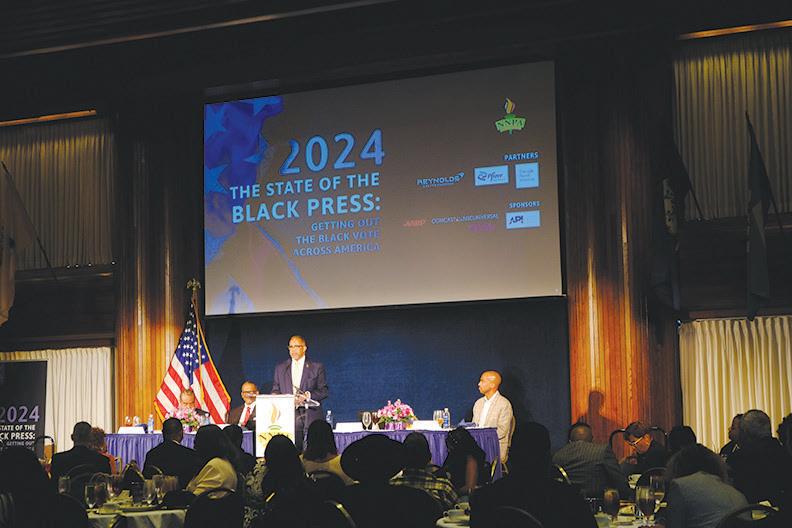
where many politicians lie with impunity and where technological advancements–like artificial intelligence–make it difficult to discern the truth, it is incumbent on Black journalism to communicate real stories about real people and do so truthfully irrespective of favor or profit lately.”
Clyburn said using Black publications to reach Black voters is imperative because many crucial historic decisions have been decided by an incredibly small margin.
“Reconstruction came to an end by one vote: 185 to 184. Jim Crow became the law of the land by one vote: eight to seven,” said Clyburn. “We must ask the Black community: ‘Are you going to be that one vote that brings in what everybody has been traditionally calling ‘the second Reconstruction?’”
“If we want to galvanize
the Black community this election year, we must make them aware of the possible consequences and that means communicating authentic stories about what has happened, what is happening and what is likely to happen,” he continued.
Clyburn said members of the press must ask themselves if they would like to make a “headline or headway?”
“If we want to keep our democracy, we must make headway on informing the American people,” he said.
Throughout the event, speakers honed in on the fact that since its inception, the Black Press has long kept the Black community informed and abreast of issues that impact their daily lives and inequalities that need to be addressed.
The first Black Newspaper was released March 16, 1827 by Samuel
Eli
New York City. Titled “Freedom’s Journal,” the men made clear why they created the publication in the very first issue, writing:
“We wish to plead our own cause. Too long have others spoken for us. Too long has the publick [sic] been deceived by misrepresentations in things which concern us dearly....”
Still today, 197 years later, members of the Black Press are “pleading their own cause.”
NNPA President and CEO, Dr. Benjamin Chavis, spoke to the publishers, editors, writers and sponsors gathered, imploring them to push forward the Black Press mission of keeping the Black community informed and pushing for progress and true equality.
“When John Russwurm and Samuel Cornish stated on the front page of the first
edition of Freedom’s Journal that ‘we must plead our own cause’ this was more than just an editorial comment. It was a call to action,” said Chavis. “That was a bold statement of intentionality. That was a statement that understood the importance of not– in life– striving to get along just to get along with oppression, slavery and the other denial of the humanity of African people that was used to justify the transatlantic slave trade,” said Chavis.
“Our cause is to publish and speak truth to power. Our cause is to wake our people up and to keep our families and communities awakened to the truth and to our collective responsibilities …to fight for freedom, justice, equality and equity.”
After speaking about the legacies of great, Black publishers who dared to start Black publications during an era in a country prone to lynchings, Chavis spoke directly to the new generation of Black Press.
I met Sister Mothyna James Brightful when she interned at the Baltimore AFRO during her senior year at Morgan State University, and it was evident she had a calling: ministering to women. Raised in a Christian family, her spirit responded to Islam in a profound and transformative way. For her it answered deep-seated questions and it fit her journey like a tailored cloth.
She’s a wife, mother, sister, friend and entrepreneur who exudes the peace she’s found — especially when she’s doing the work of helping women find their sea legs in whatever calling beckons them. So we asked Sister Mothyna to share with Word in Black how she practices her faith through the season of Ramadan.
Word In Black: As Christians, we fast during Lent in an attempt to better experience the sacrifice Jesus must have felt as he journeyed toward his crucifixion. How is Ramadan different?
“I believe that when we seek to align our minds and our beings with God, it does require us to study.”
Sister Mothyna: Our fast is distinct in that we aim to find greater peace, not only for ourselves but also to share it with everyone we encounter, including family, friends and coworkers. Sometimes people have habits they want to break, so this is a great time to do that — and not just with food. It could mean spending less time watching TV or cutting back on sweets. Some are working to spend more time with loved ones. It’s really about becoming the best version of ourselves. Ramadan isn’t a health fast. There are health benefits, but it’s a spiritual fast. People compare it to intermittent fasting, but intermittent fasting is designed for health. Ramadan is obligatory for all Muslims although there are provisions for those who are unable. We submit to the instruction in the Holy Quran in our desire to get closer to God.
WIB: What else should we know?
SM: During Ramadan we aim to read what’s called a 30th of the Quran every day. You can pick up a Quran and many of them are now separated into 30 parts. So, you have a section

that you read, called the Juz, every single day and that should become the dominant part of your discussion throughout the course of your day. By the end of Ramadan, you would have read the entire Quran.
WIB: I love this. I need to get one.
SM: It’s beautiful. I have in my home three different Bibles, plus a biblical annex, plus a metaphysical dictionary, and a Bible dictionary. And then I have about four or five Qurans. I believe that when we seek to align our minds and our beings with God, it does require us to study, because if you think about it, every prophet that I can think of had to study and align themselves with God.
So for example, Prophet Muhammad, peace of blessings of Allah be upon him, was considered an ignorant man because he didn’t know how to read. When he received a revelation from Allah, he recited it to people. So at first it was our recitation. And then it was written down. And guess who was entrusted to hold the written works? Women.
“We all stand on the shoulders of brothers and sisters who stood up who spoke out –never bowing down to the evil of the world,” he said. “There’s no question about what our posture should be in 2024 and thus, today, we ask ourselves in 2024: What is our cause?”
“Is it to appease the great-great grandchildren of those who committed Global genocide and exploitation of African people for 500 years– what is our cause today? As we face another existential threat to our very presence and existence in America and throughout the African world– what is our cause?” quipped Chavis.
“Our cause is to publish and speak truth to power. Our cause is to wake our people up and to keep our families and communities awakened to the truth and to our collective responsibilities and obligations to continue to fight for freedom, justice, equality and equity.”
Chavis said that in 2024, “the Black Press serves today the majority of 50 million African Americans who live, reside and strive every day to make ends meet.” What started as a small publication in 1827 has now inspired roughly 250 Black papers into existence.
“The Black Press today continues the legacy, cause and purpose as first published by Russwurm and Cornish, 197 years ago,” said Chavis. “The Black Press is resilient and more determined than ever before to speak out, stand up and push forward to achieve excellence and progress. The Black Press today represents the best of America and its future.”
WIB: Do people eat before sunrise?
SM: Some people do that meal which is called suhoor. Most make sure they have water before the fast begins each morning. People who are diabetic can’t go as long without food. People who have to take their meds, it is permissible. Some people want to have their coffee.
WIB: I forget how much Ramadan is affected by the calendar as well as the season.
SM: Yes. It begins in the evening of March 10 and ends on April 10. The times will be exact according to the new moon, as the Islamic calendar is Lunar.
WIB: So tell us about that evening meal.
SM: Culturally a lot of Muslims will break their fast with a date because they’re highly nutritious. It’s a good way to reactivate the body. I also like to drink something warm, like tea or room temperature water. You break your fast. Then you go pray because just like you break your fast at the prayer time, you start your fast, in theory, at prayer time. You break your fast as a family — as friends. And you pray the same way as a group.
WIB: Give me a typical meal.
SM: That is really very culturally driven, I try to have a balanced meal, meaning we have some soup, some vegetables, maybe some couscous. But later in Ramadan, your stomach shrinks so you can’t eat as much.
WIB: How does observing Ramadan affect your work day?
SM: I get up and work out in the morning before the sun comes up. I also kickbox two days a week, and that’s like 5:00 a.m. I know a sister who says the first three days are always the most difficult for her, so she reduces her work day.
WIB: And this is something everyone can do?
SM: There are provisions for women who still receive their menses. You don’t fast during that period. Breastfeeding mothers shouldn’t fast. If you’re sick, you shouldn’t fast. You can make up those days another time or you can do an act of kindness like feeding someone. And that will absolve you of that particular day.
This article was originally published by Word In Black.
Working longer hours, typically in underresourced schools, Black teachers often climb up the rougher side of the educational mountain compared with their White peers. And, like all teachers, they dealt with the COVID-19 disruptions in their profession: trying to engage and teach to camera-off students over Zoom.
But while a new survey indicates that teachers, in general, are not OK — student behavior issues, chronic absenteeism, and learning loss are pushing morale underwater — Black teachers have a better attitude than White teachers about their work.
“Black teachers report the strongest morale, while teachers who are White or of two or more races have more negative morale,” according to the first-ever Education Week 2024 Teacher Morale Index. On a scale of -100, which is a completely negative attitude, to +100, which is a completely positive outlook, overall teacher morale is -13, but Black teacher morale hovers at around +10, according to the survey.
“The teaching profession — a workforce of three million — is at an inflection point that could shape the course of the profession for the next generation of educators and students,” according to the survey report. “For the last few years, teachers have reported high levels of burnout and disillusionment—borne initially from the hardships of teaching in a pandemic and exacerbated by the escalating academic, social, and mental health needs of students.”
The survey doesn’t pinpoint why Black teachers feel more positively about their work. But some experts believe that teaching — historically held in high esteem by the Black community, and one of few professions open to Black people during the Jim Crow era — may be seen as more of a calling than just a job.
“In my opinion, Black teachers may be experiencing higher morale than their peers given the underlying purposes and motivations behind their work, but also community empowerment and racial uplift,” says Sonya Douglass, founding director of the Black Education Research Collective at Columbia University Teachers College.
“The Black freedom struggle for equal education has always been just that — a struggle,”

she says. “So one could argue that challenging circumstances or environment might not have the same impact on Black teachers as their non-Black colleagues.”
Hiewet Senghor, founder of the nonprofit Black Teacher Collective, agrees, noting that Black teachers are just 7 percent of a workforce dominated by White women. But she also points out that the 10 percent positive morale of Black teachers isn’t all that high, and they likely experience the same frustrations and burnout rates as their White peers.
“A more asset-based idea would be that Black teachers oftentimes have developed skills and capacity to make a way out of no way or make a dollar out of 15 cents,” Senghor says. “So they have better adaptability and
problem-solving skills to work through the same challenges that teachers used to serving in less resource-starved schools do.”
The data illustrates the point. White teachers not only “sharply outnumber educators of other races and ethnicities, but they also tend to work in different school environments,” according to a 2021 study by the Pew Research Center.
The highest percentage of Black teachers — 14 percent — work In Title I schools, where 75 percent or more students receive free or reduced lunches, according to the Pew study. By comparison, according to the study, schools where 25 percent or fewer students qualify for subsidized lunches have a Black teacher workforce of just 2 percent.
“HomeWork: Lessons Learned in the Home for Success in School and Life,” which I released in May 2023, marked the publication of the second edition of a book fifteen years in the making.
It reflects a composite view of my observations, recommendations and motivations for encouraging parents and parenting adults to give continued, consistent and welcomed attention to their roles as their children’s first teachers in the home. Depending on one’s age, ethnicity, experiences and other factors, a number of folks can readily acknowledge having grown up under conditions that reflected their parents, family and other adult’s values. Our advisors, mentors, role models influenced our behaviors, activities and learning, and so it is among today’s children, as they grow.
During almost five decades in public education, pre-K thru 12th grade as a classroom teacher, administrator and an advocate of lifelong learning, I have always given deference to the guidance that parents can have on their children’s learning.
Experiences as a mother and grandmother, and my continued role as mentor and advisor, gives further personal significance to encouraging the positive impact of parents on their children’s behavior in the home, school, community and beyond.
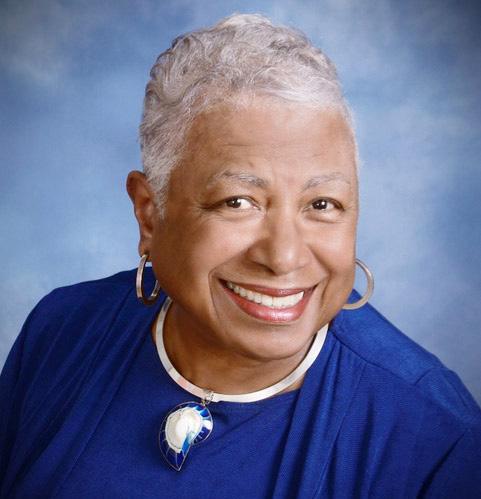
Priority attention is given to “Lesson One: Learning” as a critical area for a good beginning, and to “Lesson Ten: Heritage and Legacy,” with emphasis on recognized family values, remembered and shared over time. This is a valuable opportunity. An enriching process of bringing parents and children together in learning situations can cultivate strong relationships between them.
In schools where at least 90 percent of students were minorities, 20 percent of teachers were Black, according to the study. Yet in schools where at least 90 percent of students were White, “nearly all teachers (97 percent) also were White,” the survey said.
“Black teachers know this tax is a part of the experience.”
Meanwhile, the Federal Reserve Bank of St. Louis looked at national school funding data and found that schools with a 10 percent higher share of Black students than the district average spend $140 less per student on instruction. Senghor said it’s been established that Black teachers work longer hours for less pay than their White counterparts, in part because their roles often include informally guiding and mentoring Black students — even if they work in majority White schools. Black women in the classroom, Senghor says, “have historically engaged in “other mothering,” while Black male teachers often take on role modeling for Black boys.
It tends to happen “outside formal teaching responsibilities, and the failure to recognize and compensate Black teachers for this is a significant barrier to Black teacher retention,” she says. “In my experience, Black teachers know this tax is a part of the experience, but their commitment and belief in the importance of Black teachers being there for Black students serves as a motivation to continue on.”
Ultimately, experts say, the best way to improve teacher morale, generally, is to improve working conditions, as well as offer more classroom and administrative support. But Douglass and Senghor agree that district and school administrators must recognize Black teachers’ special role in the profession.
“Historically, Black teachers viewed education as a way to not only teach children and youth, but as central to community empowerment, racial uplift, and liberation,” Douglass says. “As Malcolm X said, ‘Education is the passport to the future, for tomorrow belongs to those who prepare for it today.’”
This article was originally published by Word in Black.
environment was one which integrated home and school learning in Community Schools. For millenniums societies in Africa and elsewhere have organized education as a communal responsibility, where it takes a village to raise a child. Yet in recent decades, the role of parents as their children’s first educator, beyond the pre-school years, has been downplayed.”
meal, dish or desert “made in the home” and enjoyed for their qualities and flavors.
The COVID-19 pandemic suggested a need to revisit the importance of parent influences on children’s learning, with attention being given to character education, behavior and values. Children and youth are appearing more prominently as victims and perpetrators of crime and violence. Currently, the response to the chronic question “Where are the parents?” The answer should be “Here! — present, willing and able.”
honesty, creativity and talent, cleanliness and respect for self and others, selfmotivation and heritage and legacy.
In his foreword to “HomeWork, 2023 Edition,” researcher at Johns Hopkins University School of Education, Dr. Robert Balfanz states “More than 50 years ago, James Coleman showed that home contributions to students’ learning and achievement were as significant, if not in some circumstances, more significant than what students did at school. More than 100 years ago, John Dewey and others argued that the best teaching and learning
“HomeWork” has been developed to revive, inspire and encourage renewed awareness of the significance of parent involvement.
HomeWork consists of ten defined lessons focused on life-skills and values: Learning, responsibility, encouragement, persistence,

This deficiency and concerns about its effect— particularly on children and youth— is prompting researchers and educators to identify responses and solutions. It is warranted relative to potential suicides, disruptive behavior, bullying and situations in this population. Cultivating an enriched role for parenting adults as their children’s first teachers can contribute to ongoing nurturing relationships and learning. “HomeWork” is a practical resource for educators, teachers and other professionals who support parent’s success in this important role.
When reflecting on personal learning experiences many can recall how and when they were taught some basic, practical information. We know where these experiences occurred— they happened in the home. They were part of family expectations. We were taught how to do numerous things, from the ordinary to the unusual. We might remember being present when a parent or relative prepared a special
Under the guidance of parents, grandparents and other parenting adults, distinctive characteristics learned at home followed us in our behaviors, attitudes, and actions, outside of home and reflected what we had been taught. In some instances, these teachings were as recognizable as the special dishes.
The Ghanaian proverb, “The ruin of a nation begins in the homes of its people,” gives authentic credit to the long-term impact of valuable experiences, activities and events cultivated in the home. A simple, honest analogy of the teaching that parents provide for children, whether compared to a special meal or the development of a child, can have a lasting significance. When people choose to reflect on and share elements of their lives and those that favorably influenced their accomplishments and successes or the ordinary things that they remember fondly or with pride, they think about home.
We are homemade! Whether embellished or critiqued, reflections on our homes and what we learned there – or failed to learn there – should give us pause to encourage others, particularly parents or parenting adults, to give sincere attention to their children as they grow in the home. The foundation they create can be a lifelong recipe for success that is homemade.

We are often told that having good cholesterol, also known as high-density lipoproteins (HDL-C), is good because it lowers the risk of heart disease and stroke. But researchers now caution that good cholesterol may not be great for all of us. The findings were discovered during a long-term study called ASPREE, released
“Our community must understand that our elders are twice as likely to be diagnosed with Alzheimer’s—or other forms of dementia as older White Americans.”
in November 2023, which examines the effects of daily low-dose aspirin in prolonging good health and preventing or delaying age-related diseases in healthy older adults.
Researchers discovered that participants with high HDL-C (80mg/ dL) have a 27 percent increased risk for dementia. And the findings for those 75 and older are even more important to note since these folks had a 42 percent

Researchers
increased risk for dementia. An ideal HDL-C level is 40 to 60 mg/dL for men and 50 to 60 for women..
The study reported that among 18,668 participants included in this analysis, 2709 had very high HDL-C at study entry, with 38 incidents of dementia in those aged less than 75 years with very high levels and 101 in those aged 75 and more with very high levels.
But what’s interesting is that risk factors are not related to diet but might result from a metabolic disorder. More research is necessary to use these findings in a preventative manner. These findings
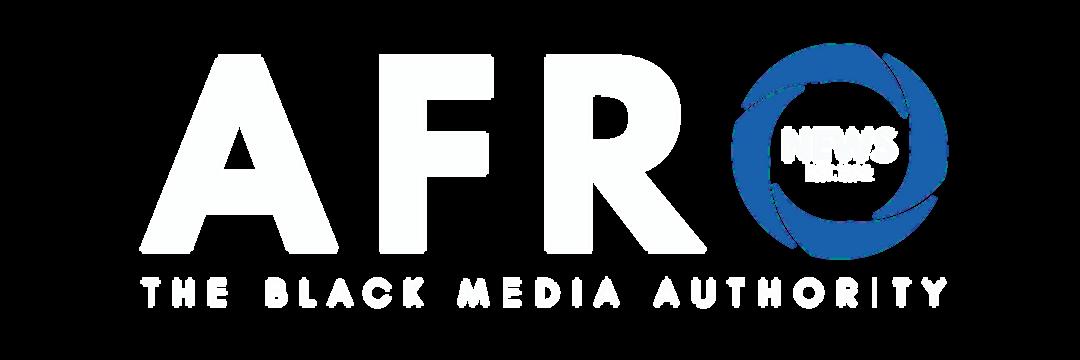
We


The war continued for Black soldiers when they returned home from WWII, and this war still rages today.
“This is Our War” not only preserves our history but lives on as a testament to the ongoing pursuit of justice. $30/copy includes
may help unlock who contracts dementia. Our community must understand that our elders are twice as likely to be diagnosed with Alzheimer’s—or other forms of dementia as older White Americans.
However, in the meantime, begin monitoring your LDL, HDL and triglyceride numbers and work toward getting them all within healthy ranges.
This may require modifications to diet, exercising more and losing weight. But if you believe your numbers put you at higher risk for dementia in the future, it is essential to discuss this with your healthcare provider.
This article was originally published by BlackHealthMatters.com.
Now’s your time to enjoy it all. In our diverse and inviting Life Plan community, surround yourself with people you’ll like and social opportunities you’ll love. Settle into a home amongst nature, supported by a continuum of care for every age and ability. At Broadmead, you’ll be able to focus on a lifestyle you truly enjoy!














Dear Rusty: I will be 64 in March and currently receive social security disability insurance (SSDI) payments. My full retirement age is 67, but I’m thinking about trying to return to work.
If I work and my earnings exceed the monthly disability payment limits, but do not exceed the annual limit, how will my disability payments be affected? Will working while receiving Social Security disability payments change my Social Security benefit amount when I reach my full retirement age of 67?
-Signed, Mending
Dear Mending: Social Security doesn’t go by annual earnings when it comes to disability (SSDI) - they go by monthly earnings. If your work earnings in any one month of 2024 exceed $1,550, that will be a flag to SS that you are no longer disabled ($2,590 per month if you’re blind). If that happens for a few months in a row, they will most likely stop your SSDI payments. Often, this happens retroactively - they won’t find out until sometime later that you repeatedly exceeded the monthly limit - but they will likely cancel your SSDI benefits and require you to repay any benefits you received in months you exceeded the monthly SSDI earnings limit, or months they deem you were capable of working without restriction.
I suggest you consider enrolling in Social Security’s “Ticket to Work” program. While enrolled, you can work and will have a rolling nine-month “trial work period” over five years, during which you can earn more than $1,110 per month (in 2024) without jeopardizing your SSDI benefits. If, after completing your ninemonth trial work period, you are taken off of SSDI because you’re no longer considered disabled, and you again become disabled and unable to work, your SSDI benefits can resume without requiring you to go through the entire application process again. You can test your ability to work, will be able to work some and can earn more than the limit in some months, which makes the Ticket to Work program your best option.
Read more about it here: https://choosework.ssa.gov/.
As for whether working while on SSDI will improve your benefit at your full retirement age (FRA), that depends. Your current SSDI benefit is equal to your FRA entitlement from your earnings record at your disability onset date (but paid to you prior to your FRA). The method for determining your benefit under SSDI is complex and depends on the age at which you became unable to work and the number of Social Security credits you had accumulated at that time. Although SS retirement benefits normally require you earn at least 40 SS quarter credits and are based on your highest earning 35 years, those approved for SSDI can get benefits with fewer than 40

credits and less than 35 years of lifetime earnings. Since each case is unique, I cannot say whether your earnings while on SSDI will improve your FRA amount, but Social Security will monitor your earnings and increase your benefit if appropriate.
For your information, your SSDI benefit would normally automatically convert to become your regular SS retirement benefit at your FRA at the same amount you were receiving while on SSDI. It’s possible that the limited earnings you may have from working while on SSDI may increase your benefit, but that’s impossible for me to predict. Your benefit is based on your lifetime earnings history (adjusted for inflation), not on your contributions to Social Security while working.
So, if you are on SSDI and wish to try returning to work, and you think your monthly earnings will occasionally exceed the SSDI limit, I suggest you contact Social Security (1.800.772.1213 or your local office) to explore enrolling in the Ticket to Work program. That would be your best option to avoid jeopardizing your SSDI benefits, and your benefit amount will be automatically adjusted by Social Security if appropriate.
In separate box:
Dear Rusty: How does Social Security handle the death of one spouse? Say, for example, the husband receives $2,000 per month in Social Security and his wife receives $1,000 per month. How is the death of either spouse handled?
Signed, Concerned spouse


Dear Concerned: Benefits to a deceased beneficiary stop as soon as Social Security (SS) is notified of the death (notification usually done by the funeral director who handles arrangements). Benefits are not paid for the month of death, only for the preceding month when the beneficiary was alive for the entire month.
A surviving spouse is entitled to the higher of two benefits – their own personally earned SS retirement benefit, or an amount based on the deceased spouse’s benefit at death. In the example you cite, and assuming the surviving spouse has reached full retirement age (FRA): If the husband dies first the wife will receive the husband’s $2,000 monthly benefit instead of her previous $1,000 amount. But if the wife died first, the husband would continue receiving only his $2,000 monthly amount because that is more than his deceased wife was receiving. Note in either case, the surviving spouse would be entitled to a one-time lump sum “death benefit” of $255.
The surviving spouse would need to contact Social Security to claim the “death benefit” and - unless the surviving spouse was previously receiving only a spousal benefit – also to claim the higher monthly amount, if eligible. If the surviving spouse was previously receiving only a spousal benefit from the deceased (and not entitled to SS retirement benefits on their own), then Social Security would automatically award their higher survivor amount when notified of the death.
If a surviving spouse has reached full retirement age (somewhere between 66 and 67 depending on year of birth) and is eligible for a survivor benefit, the amount of the survivor benefit will be 100 percent of the deceased spouse’s benefit. But if the survivor claims the benefit before reaching FRA, the amount of the survivor benefit will be reduced (by 4.75 percent for each full year earlier). The survivor’s benefit reaches maximum at the survivor’s full retirement age.
Russell Gloor is the national Social Security advisor at the AMAC Foundation, the non-profit arm of the Association of Mature American Citizens.
This article is intended for information purposes only and does not represent legal or financial guidance. It presents the opinions and interpretations of the AMAC Foundation’s staff, trained and accredited by the National Social Security Association (NSSA).
NSSA and the AMAC Foundation and its staff are not affiliated with or endorsed by the Social Security Administration or any other governmental entity. To submit a question, email ssadvisor@ amacfoundation.org.
This article was originally published by the AMAC Foundation. See more on afro.com


With only a few weeks left in Maryland’s 90-day legislative session there is one critical piece of unfinished business that the General Assembly should address: pass a comprehensive package of bills that will help improve our state’s upside down and unfair tax system and meet the needs of Maryland communities.
The Fair Share for Maryland Act (SB766/ HB1007) is championed by a large number of organizations and advocacy groups. What these groups share in common interest is the understanding that we are all in this together. Which is why we have come together as a group of minority-led organizations to lend our voice to the chorus of advocates demanding the passage of this legislation.
The Fair Share for Maryland Act will help to build a stronger middle class while also increasing the finances of so many people, particularly of color, who continue to lag economically behind their peers in other ethnic groups.
Passing the Fair Share for Maryland Act is a matter of equity. When passed this bill will ensure the profitable multinational corporations doing business in our state no longer benefit from the cleverly crafted tax loopholes that allow them to avoid paying Maryland taxes. When passed this bill will tighten the ring on those who have found ways to skirt the system by

recently received roughly $30 million in
By Tashi McQueen AFRO Political Writer tmcqueen@afro.comMayor Brandon M. Scott, U.S. Rep. Kweisi Mfume (DMd.-07) and other city officials announced the award of nearly $30 million to 11 community projects in Baltimore. The money will be used to increase permanent supportive housing (PSH) and affordable housing through the Housing Accelerator Fund.
The investments were made possible through the $641 million grant Baltimore acquired through the 2021 America Rescue Plan Act (ARPA).
“It is the exact type of project we want to spend ARPA on–providing long-term, tangible, real-world solutions to some of Baltimore’s most vulnerable residents and families,” said Scott on March 11 at New Shiloh Village Senior Living.
The PSH merges affordable housing, health care and other community-based aid to assist Baltimoreans and their families who are experiencing homelessness, are formerly homeless, or are unable to keep stable housing.
The 2023 Baltimore City Point-In-Time Count Report found that 1,551 people were homeless in Baltimore on one night in January. About 58 percent of them resided in emergency shelters, 34 percent were in transitional housing, and less than 7 percent were unsheltered.
Housing Accelerator Awards
• 407 Franklin Partners $1.5 million
• Beacon House $1.8 million
• Belvedere Place $2.75 million
• Dominion $1.15 million
• Episcopal Housing $7 million
• Govans Ecumenical Development $1.9 million
• HCH Real Estate $3.4 million
• Homes For America $4.25 million
• NHP Foundation $3.2 million
• Springboard Community Service $419,000
• Unity Properties and New Shiloh 3 $2.5 million
“I feel particularly good to know that these funds– just this bit– will create 450 housing units in this city for people to live in and to grow in and to survive in,” said Mfume. “We will continue to find ways to make sure that the housing crisis in this city is in fact dealt with.”
Scott, Mfume and director of the Mayor’s Office of Recovery Programs Shamiah T. Kerney, whose office launched the Housing Accelerator Fund, defended how the funds have been used, which has recently been under scrutiny by mayoral candidates.
“It is easy to be critical now about how ARPA funds are being spent or the commitments we are making,” said Kerney.
Advocates call for better wages and data collection for workers in care industryBy Megan Sayles AFRO Business Writer msayles@afro.com
Members of Caring Across Maryland, a coalition that represents advocates, workers and patients in nursing homes, assisted living and home care, assembled in Annapolis, Md. on March 5 alongside partner organizations to rally support for key legislation that would enhance compensation and data collection across the state’s care landscape.
The event was a part of a larger national campaign spearheaded by the National Domestic Workers Alliance (NDWA). The initiative advocates for government to invest in a care infrastructure that provides comprehensive support and services to paid and unpaid caregivers and those who receive care. This includes living wages, benefits and pathways to citizenship for care workers, who predominantly tend to be women and people of color.
Caring Across Maryland championed two bills while in Annapolis, the Homecare Workers Rights Act, or HB39, and HB189. The first would bar the Maryland Department of Health from reimbursing residential service agencies (RSAs) that hire care workers as independent contractors. The second would require
Dr. Sherita Hill Golden has exited her post as vice president and chief diversity officer for Johns Hopkins Medicine (JHM), according to an email sent by Dean and CEO Theodore L. DeWeese and Executive Vice President Kevin W. Sowers on March 4. As the medical institution prepares to conduct a national search for a new, permanent diversity lead, Chief Human Resources Officer Inez Stewart will assume the role in the interim.
Golden’s departure comes after she received public criticism over her definition of “privilege” in an email sent out to the JHM community, which she later retracted.
“She has been a valuable member of the Johns Hopkins Medicine leadership team, and –like many of you– we wanted her to stay in her role, but we respect her decision.”
“We are writing to share the news that after a great deal of reflection, Dr. Sherita Golden has decided to step down from her role as vice president and chief diversity officer for Johns Hopkins Medicine,” wrote DeWeese and Sowers in the email.
“She has been a valuable member of the Johns Hopkins Medicine leadership team, and, like many of you, we wanted her to stay in her role, but we respect her decision.”
In a digital January newsletter, Golden defined privilege as “a set of unearned benefits given to people who are in a specific social group.” She proceeded to list White people, males, Christians, heterosexuals and able-bodied people—among others— as part of those groups.
After the email was shared beyond the JHM community, an X account titled “End Wokeness” posted a screenshot referring
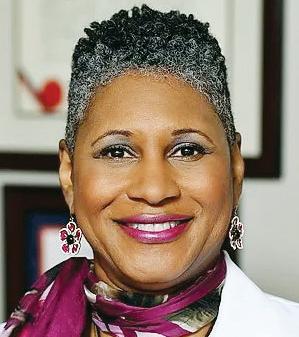
March 4.
to it as a “hit list of people automatically guilty of privilege whether they know it or not.” The viral post sparked a number of negative comments about diversity, equity and inclusion (DEI) and calls for Golden to be fired.
JHM rebuked the language used in Golden’s definition, saying it ran counter to its values and commitment to serving everyone equally. The medical institution said Golden acknowledged her mistake and retracted the definition.
Students and employees of JHM expressed their disappointment over the renouncement in an open letter to DeWeese and Sowers. They contended that the pushback
on the definition was a part of a broader effort to spread disinformation about the importance of DEI at colleges and universities.
Golden is not the first Black woman to resign from a prominent position in higher education in the wake of public backlash this year. In January, Claudine Gay, the first Black president of Harvard University, resigned from her position after coming under fire for her response to questions about antisemitism in the wake of the Oct. 7 Hamas attack on Israel.
“Surely discussions about privilege can be challenging. The word is easily misinterpreted or taken to mean that people who benefit from systems of advantage are immoral or unworthy,” wrote JHM students and employees.
“However, it is important for our institution to respond to assaults on our commitment to DEI with courage and conviction. In the face of bad-faith attacks, Johns Hopkins Medicine and Johns Hopkins University must state clearly, loudly and proudly that we value diversity, equity and inclusion.”
JHM leadership did not address the controversy in their announcement of Golden’s resignation. Instead, they praised her dedication to health equity and efforts to recruit and retain diverse talent across the institution.
Golden will remain on JHM faculty as the Hugh P. McCormick Family Professor of Endocrinology and Metabolism.
Megan Sayles is a Report For America corps member.

Baltimore County’s Department of Health has announced that Dr. Gregory Wm. Branch, an internal medicine doctor, is no longer Baltimore County’s health officer.
The Maryland Department of Health (MDH) has not provided a reason for Branch’s departure.
“As of March 4, 2024, Dr. Gregory Wm.
“ The Department and the County thank Dr. Branch for his service to the county and wish him well in his future endeavors.”
Branch is no longer the Health Officer for Baltimore County and has departed County service,” the department said in a press release.
“The Department and the County thank Dr. Branch for his service to the county and wish him well in his future endeavors.”
Branch had occupied the role since 2006. He is a New York City-born, magna cum laude graduate of the State University of New York at Buffalo School of Medicine and Biomedical
Continued from B1
avoiding paying taxing at all.
The simple truth is that the bill would generate an estimated 1.6 billion in new revenue, revenue that our state so desperately needs. Revenue that would also see almost a quarter of a billion dollars directly allocated to providing tax credits to working families. Families who are living on the margins of society, as well as those who live literally paycheck to paycheck. The remaining revenue could be used to fund our schools, housing, transportation and addressing issues related to child poverty.
Why are we choosing to lift our voices at this time, a time considered as the late stage of the session? Well, we’re glad that you asked. We choose to lift our voices in support of this legislation because throughout this nation’s history we’ve adapted to hearing rejection.
Throughout the course of our history, our communities have become accustomed to being told to wait.
More importantly we are familiar with the political jargon that suggests we understand that “now is not a good time.” Well, we are of the opinion that if not now, then when? And if not this legislature, who? We recognize that we are blessed
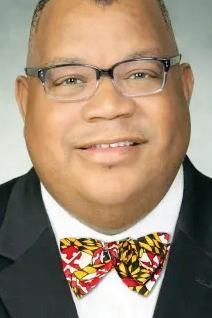
a certified physician executive and an internationally recognized fellow of the American College of Physicians.
Della Leister has been named the interim health officer and acting director. She has served as the deputy health officer for Baltimore County since 2010. Leister is a graduate of St. Joseph School of Nursing
Continued from B1
Sciences. Branch trained at the Johns Hopkins Hospital in the William Osler Internal Medicine Residency Program. Branch is nationally recognized as
to have some of the most diverse legislative leadership in this nation. They carry the dreams and hopes, yet unborn, of ancestors who slaved and worked for this nation with very little compensation. Leaders who have inherited the baton of those that could not finish the race, but believed that they could make it. And so, if anyone knows the power of standing for what is equitable and just, it ought to be this legislature.
There are those that will say that the session is almost over and we don’t have that long. But we simply remind them of the words of Dr. Martin King, who said, “the arc of the moral universe is long, but it bends towards justice.” Asking the wealthy to pay their fair share requires some bending. Reforming our state income tax will require some bending. Fixing the estate tax on multimillionaires will definitely require some bending.
Bending and bowing can sometimes be confused. But we are not confused. We are calling on the legislature in these final weeks to stop genuflecting to big donors and corporate dollars. We understand they write checks, but it’s the working families in our state that write their names on ballots.
While it’s true Maryland may be facing some revenue shortfalls, it’s also true that we can create a more equitable fiscal and tax response. It’s not lost on any of us and especially our supporters that many of our legislators ran on creating a fairer tax system. Therefore, we are calling on the Maryland Legislative Black and Latino Caucuses and their members to stand up for those of us who supported you. Our communities need you to pass the Fair Share for Maryland Act now.
Rev. Dr. K. A. Slayton is campaign manager of the Maryland Center on Economic Policy. This commentary is signed by the following: Kobi Little, president of the Maryland State NAACP; Dayvon Love, director of policy for Leaders of a Beautiful Struggle; Tershea Ewell, executive operations manager for the Greater Baltimore Urban League; Michael J. Wilson, director of Maryland Hunger Solutions; Ninfa Amador, a research and policy analyst for Casa de Maryland; Claudia Wilson Randall, executive director of the Community Development Network of Maryland, Marlon Tilghman, co-chair of BRIDGE Maryland and Carl Snowden, of the Caucus of African American Leaders.

Diploma program and University of Maryland School of Nursing Bachelor’s in Nursing Program.
A search for the next Baltimore County Health Officer is in the works.
The Maryland Department of Health declined the AFRO’s request for further comment on this matter.
RSAs to submit data to the Maryland Department of Labor regarding wages for care workers.
“We’re working to transform the care industry,” said Chanelle Croxton, director of state strategies and organizing for NDWA. “We’re making sure that people who need access to care can get that access and that the folks who are working in it are able to have dignified wages and be in this profession that they love without having to sacrifice their livelihood.”
According to the Bureau of Labor Statistics (BLS), Maryland’s home health and personal care aides earned an average of $15.67 per hour and $32,590 each year in 2022. Meanwhile, their day-to-day responsibilities can include assisting individuals with bathing and dressing, administering medications, shopping for groceries, preparing meals, housekeeping and driving individuals to appointments.
Aside from substandard wages, a major issue for the care industry is misclassification. According to Croxton, care workers are classified as independent contractors at times. This has implications for labor protections and taxes.
Care workers classified as independent contractors must use 1099 tax forms, meaning they are subject to paying for both self-employment and income taxes. They also do not receive benefits like overtime pay and health insurance.
Baltimore native Vivian Boone has been in home care for 35 years, working for The Elizabeth Cooney Agency, Sunrise Senior Living and Chesapeake Home Health Care amongst other agencies. Over her career, she’s generally made anywhere from $12 to $15. She works a parttime job in a school cafeteria to supplement her income.
“If t’s a difficult patient, you might get $18,” said Boone. “But that doesn’t [reflect] that I have to come in, get you out of bed, put you in your wheelchair, help you stand to get a shower, cook your meals and wash your clothes. It takes a toll.”
Although Boone said she was hired as an employee, her current agency has classified her as an independent contract.
“I get no benefits. None. I’m going to be hit real hard at the end of the tax year,” said Boone. “Yeah, I could find another job, but right now I just want to focus on getting this fixed.”
Croxton said HB189 is positioned to complement a federal proposal from the Centers for Medicare and Medicaid Services that would direct more funds to care workers’ wages. The rule, Ensuring Access to Medicaid Services, proposes that 80 percent of Medicaid payments for homemaker, home health aide and personal care services be earmarked for workers’ compensation.
“With information on what workers are making, we’re able to come back to the legislature to ask for our fair share of that and ensure that workers actually see the benefit from the funding that’s put toward this work,” said Croxton.
Both bills have passed the House and are being considered by the Senate Finance Committee.
Megan Sayles is a Report For America corps member.

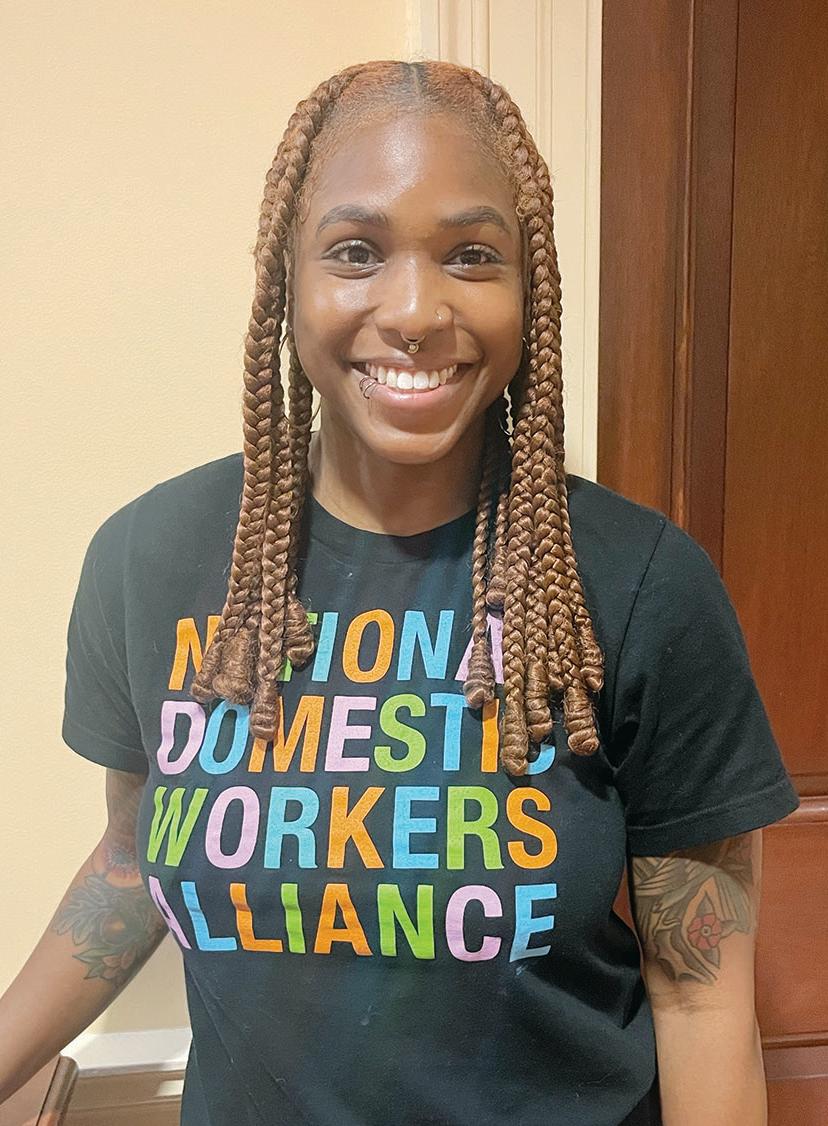
Continued from B1
“Let me also remind you and take you back to where we were when many of these decisions were being made.”
She highlighted that there were numerous people facing housing, food and job insecurity during the initial years of COVID-19.
“We did not know what normal would look like,” said Kerney.
By law, the city must commit all ARPA funds by Dec. 31 and they must be spent by Dec. 31, 2026.
Nearly all of the ARPA funding has been committed to date. According to the Baltimore City ARPA Reporting Center, around 31 percent has been spent as of Feb. 29.
“We have to make sure that these projects and things are ready to go because we know there’s timelines and limits on what you can use the money for,” said Scott. “What we’re not going to do is just do things that sound good, but actually won’t impact and help people.”
Thiruvendran “Thiru” Vignarajah, a leading candidate for Baltimore mayor, responded to their comments.
“Devoting funds to housing is a worthy cause, but this feels a dollar short and a day late,” said Vignarajah. “We needed this money
“I feel particularly good to know that these funds – just this bit–will create 450 housing units in this city for people to live in and to grow in and to survive in.”
two years ago. We needed recovery funds to be deployed for recovery when we were still recovering.”
“The notion that there are limitations on what the money can be spent for is no defense at all,” he added.

The Archdiocese of Baltimore invites you to attend Mass at a Catholic Church this Easter and wishes you and your loved ones a blessed Easter season.


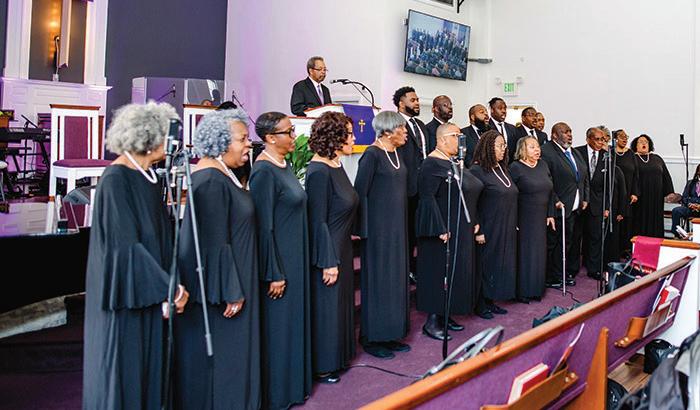

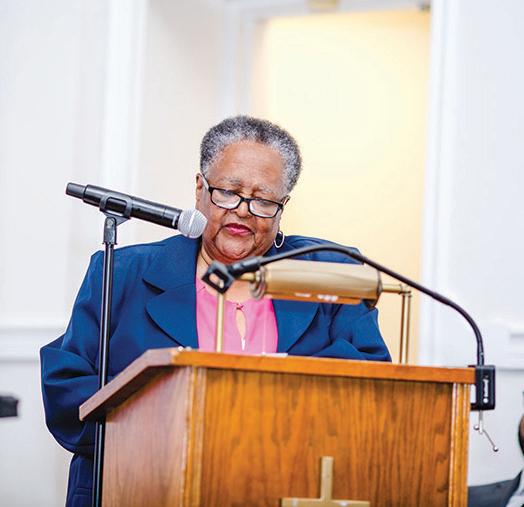
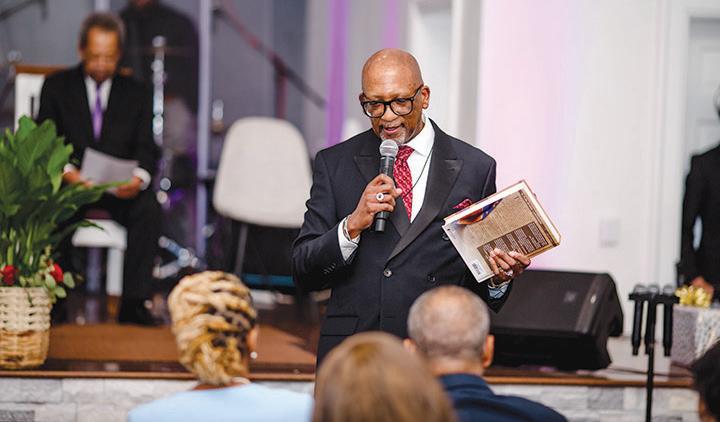
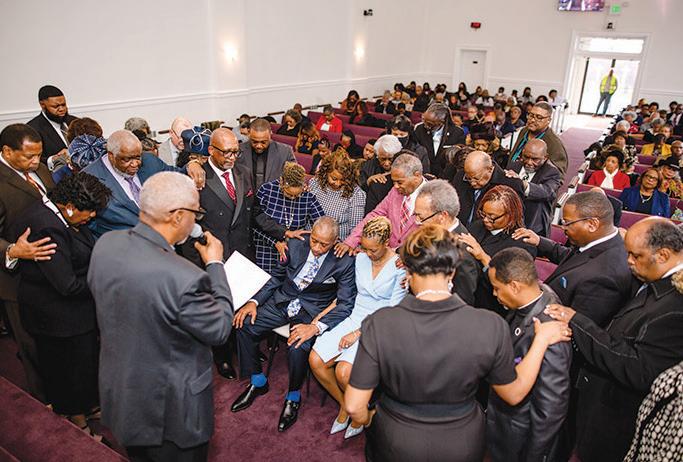 By AFRO Staff
By AFRO Staff
Prior to moving into her role as pastor of Pleasant Hope Baptist Church, Wilson founded and served as pastor of Nu Season Nu Day Church and Ministries. Wilson has been dedicated to her work in the Black community for decades, and served as chair of the Maryland Commission on African American History and Culture from 2015 to 2019 and again from 2019 to 2023.


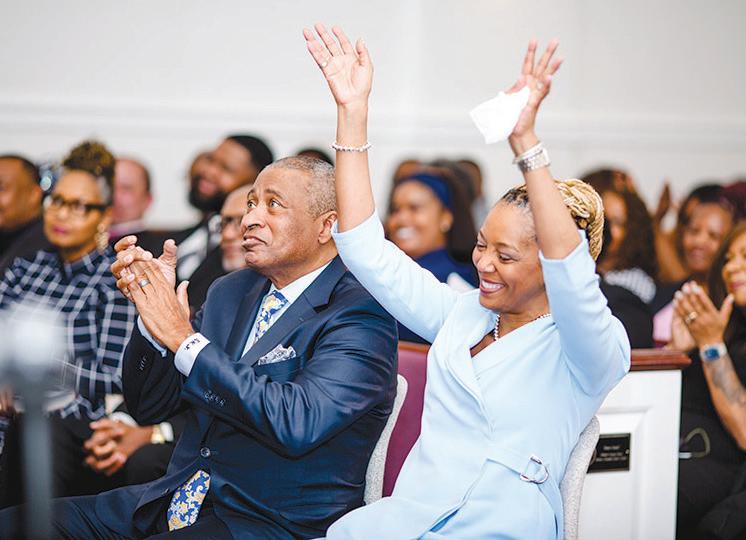


Today, Black Classic Press stands as a full-fledged, Black book publishing company in Baltimore. However, the historic entity began its journey as a mission founded by W. Paul Coates in 1978. The publishing house’s origins rest in the George Jackson Prison Movement, an organization Coates started in Baltimore after leaving the Black Panther Party.
Coates formed The George Jackson Prison Movement to provide support to incarcerated men and women as they transitioned back into the community. It was named after Black freedom fighter George Jackson, who was sentenced to one year to life in 1961 in California after a gas station armed robbery of $70.
While imprisoned, Jackson wrote letters detailing his inhumane treatment and organized protests with fellow inmates to demand prisoners’ rights. In an escape from prison, Jackson was shot down by guards in 1971.
“It was inspired by George Jackson, but at that time, he had been killed. It was done more with the memory of how he was transformed in the jail and the possibility that books could transform other people,” Coates said. “Books were central to us at that period.”
Coates, a native of Philadelphia, grew up with a love of reading. He spent much of his time in libraries as a young person. While serving in the military during the Vietnam War, he cultivated a deep awareness of Black literature.
In spite of the prison program’s defeat, Coates has intentionally hired previously incarcerated individuals since Black Classic Press’ founding.
“We always hired people who were re-entering [society] and continue to do that today,” Coates said. “We have people returning to our community every day, and these are good people who need jobs just like anybody else.”

The principal goals of the George Jackson Prison Movement were to establish a Black bookstore in Baltimore, create a publishing house to produce books for the bookstore and open a printing company to print books for the publisher. Returning citizens would then be employed at these businesses upon their release.
Black Panther Party, not only wanted to provide returning Panthers and other citizens with jobs upon their reentry into society, he wanted them to serve as restorers of the Black community.
The bookstore opened first in 1972, supported by community chicken dinners and book drives. But the program never got off the ground.
“It was attacked largely by local Baltimore City police, by state police and by the feds, who did all they could to undermine our work,” said Coates. “The program was never successful.”
The bookstore closed in 1978 as Black Classic Press formally opened its doors to the public. The publishing house, located in Southwest Baltimore, specializes in re-publishing out-of-print works by and about people of African descent, like Drusilla Dunjee Houston’s 1926 book “Wonderful Ethiopians of the Ancient Cushite Empire.”
Publishing can be a fickle industry, especially for small, niche publishers. It’s a capital-intensive business and largely dictated by everchanging reader trends and demands that fosters challenges in managing inventory.
Coates said operating the business is a struggle daily. But, he
“People realize how important it is to keep books about Black people in print, and they continue to see value in the books that were first printed long before they were born.”
identified continual support from the Black community as the driving force behind the publishing company’s perseverance over the years.
“In our case—publishing Black books— of course we had even more struggles, but we’ve also had tremendous support for our work,” Coates said. “People realize how important it is to keep books about Black people in print, and they continue to see value in the books that were first printed long before they were born.”
Ramunda and Derrick Young, founders and owners of African Diaspora bookstore MahoganyBooks, have looked to Coates, affectionately called “Baba Coates,” as a mentor and confidant. The couple regularly employ Coates for insights and trends in the Black book industry and to source works.
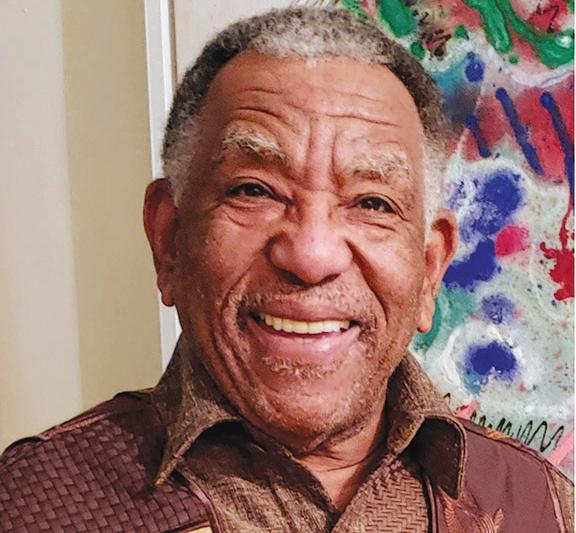
a Jamaican-born Black nationalist known for founding the Universal Negro Improvement Association. Garvey was imprisoned in 1923 for mail fraud of which he maintained his innocence.
Many believe his incarceration and later deportation was politically motivated, as Garvey, a Pan-African and Black Nationalism supporter, was outspoken about Black pride and economic independence.
“To have him call on us specifically for that was a joy. He held our hand through the entire journey,” Ramunda Young said. “We reached out to several Black bookstores across the nation and put together a whole public relations push behind it. It was an effort to unify Black booksellers.”
The missions of both Black Classic Press and MahoganyBooks become even more critical in the face of attacks on libraries, Black history and bans on Black books across the country today.
“The books that I’ve personally read and have opened my eyes to my history and heritage are a direct result of his company,” Derrick Young said. “These weren’t books that I found anywhere else in any other store. This is the significance of ensuring that our books, our history, our authors and our voices have a platform because no one else is going to prioritize them except for us.”
calling 410-554-8200
“All of it was intended to be a prison support program for brothers and sisters who were re-entering the Baltimore community from the jails and prisons,” Coates said. Coates, a former leader of the Baltimore
“Back in 2017 when we were opening up our first physical store, some of the conversations I was having with him were about the strategy of business, like how you handle your money and cash flow,” said Derrick Young. “As we’ve continued on, we’ve had some really good conversations about the importance of assets and how they can be leveraged to benefit your business. These are things that as an early entrepreneur you don’t learn until later, but because he was there, we were able to pick them up and integrate them into our overall business strategy.”
A couple of years ago, Coates reached out to the Youngs asking them to collaborate on his efforts to exonerate the late Marcus Garvey,
Coates affirmed this stance, saying when people don’t have the means to tell and preserve their stories, they cease to exist. He believes it’s the Black community’s duty to protect Black history and Black books from attempts to misrepresent and erase them.
“Unless we’re there to tell a different narrative, and it’s told through the lens of the people who experienced it, we’ve given up a large piece of history that should never be sacrificed,” Coates said.
Megan Sayles is a Report For America Corps member.
Black women are taking the workforce by storm with their growing presence in corporate America and increasing business ownership.
It was reported by JP Morgan Chase that Black women are the fastest growing group of entrepreneurs. And though only 39 percent of Black-owned businesses are operated by women compared to 53 percent operated by men, according to pewresearch.org., the presence of Black women in professional environments indisputably is on the rise.
As Black women and other women of color (WOC) are beginning to reshape the business world, several organizations are helping support and promote them as they continue to break barriers in the workplace. As part of the AFRO’s observance of Women’s History Month, this week, we take a look at Black organizations across the country aimed at helping Black women.
1.) Dress for Success
Dress for Success is dedicated to helping women achieve economic independence by providing professional attire, a network of support and career development tools to help women thrive at work and in life. The organization has provided thousands of women with workforce readiness and employment retention programs. Although the organization has a heavy focus on providing women with outfits that help them feel prepared for the workforce, they also provide a series of other free programs, including a career center, professional women’s groups and mentorship opportunities. Through these services they’re equipping women with the tools they need for a successful career in a professional work environment, all the while providing them with the opportunity to grow their professional skills and network. As an affiliate of Dress for Success Worldwide, they have over 150 sister affiliates in 30 countries around the world.
For more information about Dress for Success and to find a location near you, visit: www.dressforsuccess.org.
2.) National Association of Black Female Executives in Music and Entertainment
Show business can be a game with a lot of smoke and too many mirrors– especially if you identify as a woman. While many female entrepreneurs struggle to break into the entertainment industry, there is hope – and help– in the resources that come from the National Association of Black Female Executives in Music and Entertainment

As
(NABFEME). The organization operates roughly 20 business centers across North America, Canada and abroad aimed at helping women break into the music and entertainment business.
According to information released by the organization, women entrepreneurs looking to work in the entertainment industry are afforded “experiences that include meetings, events, networking and creative programs as well as corporate alliances that assist our members in accomplishing both their personal and professional goals. The organization maintains a focus on the female agenda of education, equality, networking and professional inclusion.”
NABFEME was founded in 1999 and aims to support women vocalists, musicians, DJs, on air personalities and more. To find out more about this organization, please visit www. nabfeme.org.
3.) The Women’s Center for Economic Opportunity (WCEO)
Founded in 2013 by Keena M. Smith, the WCEO elevates, equips and empowers Black women and women of color to access the resources and knowledge needed to create generational wealth and a legacy of economic impact. With a focus on economic equity, inclusion and justice, WCEO serves as an advocate for the elimination of racism and is working to close the racial and gender wealth gap. Through a series of programming and events like their Bubbles and
Bags event, Aspire Accelerator Program and the Aspire Business Conference, they’re creating community and providing greater resources for wealth-building to women of color in their community Visit their website at www.womensceo.org to find out more about their mission.
4.) Black Career Women’s Network (BCWN)
The Black Career Women’s Network is a national organization that is dedicated to fostering the development and professional growth of Black women in the workplace. Founded by Sherry Sims in 2012, for over a decade the BCWN has been supporting and empowering Black career women by inspiring them to advocate for themselves, lead with distinction and take control of their professional destinies. Through coaching, mentoring, community, signature events and shared experiences, BCWN has been breaking down barriers and amplifying opportunities that ensure Black women are well equipped with the skills they need to excel. To join the BCWN and find out more about their network, visit their website at www.bcwnetwork.com.
5.) National Association of Women Business Owners (NAWBO)
The National Association of Women Business Owners (NAWBO) is a thriving organization that was founded by a group of like-minded women in 1975. The organization has seen its members climb to the pinnacle of success ever since. Seven years after their founding, they held their first conference in Houston which helped them earn national recognition. To date, the organization has chapters in all 50 states where they motivate fellow members, share resources and help boost the economy. They also honor other trailblazers through the Remarkable Women Award annually.
To learn more about them visit nawbo.org.
6.) Buy From a Black Woman
Black women in business can always benefit from getting their product and their name in front of the public. One organization looking to evangelize the good news about women entrepreneurs is the nonprofit, Buy From a Black Woman (BFABW). The organization, founded in 2016, has an online directory that features women-owned businesses from around the country. BFABW prides itself in offering resources to help Black women such as scholarships and grants, free worksheet downloads that address everything from goal planning to accountability, panel discussions and case study opportunities.
To learn more about Buy From a Black Woman, please visit https:// www.buyfromablackwoman.org.

New research published in the Annals of the American Thoracic Society reveals significant racial disparities in sarcoidosis incidence in the United States. Based on data from the Optum health care database covering 15 percent of U.S. residents over three years, from 2010 to 2013, the study sheds light on the impact of environmental exposures on sarcoidosis risk, mainly focusing on the variations among ethnic groups.
This revelation comes more than 15 years after the disease gained attention because of the untimely death of actor-comedian Bernie Mac, who battled sarcoidosis for 25 years before dying in 2008 at the age of 50.
While Mac’s publicist attributed his death to pneumonia, not sarcoidosis, medical experts claim the interconnectedness of the two conditions cannot be ignored. They argue that individuals with sarcoidosis are predisposed to pneumonia, which places emphasis on the significance of understanding and addressing this complex disease.
The latest study utilized the Optum health care database covering three years from 2010 to 2013 and identified 29,372 adult patients with sarcoidosis. Notably, 55 percent of these patients were over 55 years old at the time of diagnosis, challenging previous assumptions about the peak age of the disease.
Among the key findings, the incidence and prevalence rates of sarcoidosis were notably higher in African Americans compared to other ethnic groups. African Americans exhibited an incidence rate of 17.8 and a prevalence rate of 141.4 per 100,000, while White individuals

“In trying to understand the underlying causes of exposure effects that differ by race, one cannot overlook the potential of racial bias in the diagnostic workup of sarcoidosis cases and even in the exposure assessment that could lead to spurious results.”
of environmental exposures on sarcoidosis risk. Exposure to mold, musty odors, various metals and farm animals increased the odds of sarcoidosis, with African Americans showing stronger associations between environmental factors and the disease compared to European Americans.
factors and racial disparities in future research and healthcare initiatives related to sarcoidosis prevention and treatment.
“The present study adds further support to multiple exposures as risk factors for sarcoidosis identified in the National Library of Medicine’s ‘A Case Control Etiologic Sarcoidosis Study’ including, but not limited to, protective effects of tobacco exposure and risk-increasing effects of metals and insecticides,” Albert M. Levin, Ph.D, director of the Center for Bioinformatics at Henry Ford Health, and colleagues wrote.
had rates of 8.1 and 49.8, Hispanics at 4.3 and 21.7, and Asians at 3.2 and 18.9, respectively.
The data provides a comprehensive snapshot of sarcoidosis in the United States, challenging prior estimates of 150,000 to 200,000 cases. The study’s findings underscored the need for heightened awareness, early detection and tailored treatment strategies for different ethnic and demographic groups.
The research also explored the impact


The study emphasizes the need for a more thorough understanding of the etiology of the disease, even though granulomas form and grow during sarcoidosis without known pathogens. The data challenges prior estimates of sarcoidosis cases in the U.S. and highlights the importance of considering environmental
“In trying to understand the underlying causes of exposure effects that differ by race, one cannot overlook the potential of racial bias in the diagnostic workup of sarcoidosis cases and even in the exposure assessment that could lead to spurious results,” Levin and colleagues wrote. “Reports of disparate disease outcomes for low-income African Americans support this possibility, and future studies should be appropriately designed to minimize or eliminate such biases and explore measures of structural racism as potential contributory exposures to the differences in risk of sarcoidosis between African Americans and European Americans.”
This article was originally published by NNPA Newswire.
We all need health care, but rarely do most people know the ins and outs of the system. At Word In Black, we’ve vigorously reported on health care inequities, mental health and what needs to change to treat Black folks better. But we’re taking a deeper look at the injustices related to access to and the affordability of pharmaceutical drugs.
functions in health care, and what makes prescription drugs for common chronic illnesses so expensive. We’ve also compiled a list of helpful resources to get cheaper diabetes drugs and organizations that are working to change policy.
How are drugs priced?
And drugs that can reduce hospital trips, doctor visits and expensive surgeries are usually priced higher because of the savings offered to customers in the long run, according to Investopedia. Drugs are also given a higher price if it can extend or even save someone’s life.
To be frank, there is a major lack of transparency in the way prescription drugs are priced. Pharmaceutical companies make and sell drugs, but negotiations happen with little to no oversight. Oftentimes, pharmaceutical companies point to research and development as the reason behind their list prices. When a drug comes out, pharmaceutical companies’ price that drug based on what they feel its value is to
“To have a drug that costs thousands of dollars– even if it saves their lives– if you don’t have [the money] it’s useless to you.”
About 133 million Americans are living with at least one chronic illness. And, Black people are at a disproportionate risk for developing certain diseases like hypertension, heart disease and diabetes. A chronic disease diagnosis is often quickly followed by a treatment plan that includes prescription drugs.
In a 2023 KFF Health Tracking Poll, 36 percent of Black adults were more likely than White adults to say it is difficult for them to pay for prescription drugs. And Black and Hispanic adults were more likely to say they skipped or postponed health care they needed in the past 12 months due to cost.
For our newest series, Life or Debt, we’re focusing on diabetes medication. And in the words of Jason Nolden, a New Yorker living with Type 1 diabetes who I interviewed for the first story in this series, “Health care is something you need; it’s not a choice.”
That’s why in this guide, we’ll cover the history of drug pricing, how insurance
an individual, Georges C. Benjamin, executive director of the American Public Health Association told Word In Black. Some argue that what they charge is reasonable, considering the investment in research to produce a drug.
“The problem is … it’s not reasonable, because if you can’t afford it, you can’t use it,” Benjamin says. “To have a drug that costs thousands of dollars, even if it saves their lives, if you don’t have (the money) it’s useless to you.”
Drug companies can also raise the price of their drugs above inflation rates, because they are unregulated. When pricing their drugs, pharmaceutical companies consider uniqueness and effectiveness of the drug, and competition from other companies.
Pharmaceutical companies also typically raise the prices of their drugs in January to earn more revenue. The U.S. government is also not involved in setting prices. But insurance companies and the pharmacies that sell the prescriptions are responsible for the final price a customer will pay.
What are pharmacy benefit managers? And how does it intersect with drug rebates?
Pharmacy Benefit Managers (PBMs) are companies that manage prescription drug benefits on behalf of health insurers, Medicare Part D drug plans, large employers and other payers, according to the Commonwealth Fund. They negotiate with drug manufacturers and pharmacies to control drug spending. PBMs have a major “behind the scenes” role in determining total drug costs for insurers, determining patients’ access to medications and deciding how much pharmacies are paid.
This matters because PBMs operate in the middle of the prescription drug distribution chain. One of their most notable functions is developing formularies or lists of covered medications on behalf of health insurance companies. Formularies will vary with each insurance company. So, a prescription drug covered on one plan, may not be covered on another.
See more on afro.com
This article was originally published by Word In Black.

With plenty of home crowd support, Norfolk State’s women’s team captured the MEAC Tournament championship at Scope Arena with a 5146 victory over Howard University on March 16.
Kierra Wheeler’s gamehigh 20 point performance staked the Spartans to their third overall conference championship and their second consecutive.
The MEAC’s Player of the Year added 15 rebounds and was joined by Diamond Johnson, who scored 12 points and was named tournament Most Outstanding Performer.
Johnson scored all of her points in the second half and played a major role over the final three
“Last year when we went, there is a special feeling that you get when you see that NCAA March Madness banner as you approach the arena.”

the Division I NCAA Tournament. They set off for March Madness as No. 15 seeds where they will face No. 2 seed Stanford on March 22.
Stanford – entering its 36th consecutive tournament appearance –present a tall challenge for the Spartans (27-5, 13-1).
Still, they are excited about the opportunity to return to the Big Dance.
“Last year when we went, there is a special feeling that you get when you see that NCAA March Madness banner as you approach the arena,”
Vickers said. “I think we were happy to be there last year. But we now feel that if we rebound the basketball, play defense and make some of those shots, we can play with anybody.”
MEAC All-Tournament team:
Most Outstanding Performer
Diamond Johnson, Norfolk State University
Most Outstanding Coach:
minutes where the Spartans held off the hardcharging Bison.
“We started a little sluggish,” Norfolk State
coach Larry Vickers said. “But I feel like we eventually got it together.”
The Spartans earned an automatic berth into
Larry Vickers, Norfolk State University
Kierra Wheeler, Norfolk State University
Iyanna Warren, Howard University
Laila Lawrence, Coppin State University
Kaiya Creek, Howard University
The Howard University men’s basketball team proved that tough-minded teams are difficult to defeat – especially during tournament time.
Covered with confetti, the Bison walked out of Scope Arena on March 16 with a hard-earned MidAtlantic Eastern Athletic Conference Tournament trophy and enough confidence to fill the nearby Chesapeake Bay.
Who wouldn’t gain confidence after winning in the rugged, taskfocused fashion they did?
First they knocked off Morgan State on March 14 – avoiding a lategame rally by the Bears. They were patient and disciplined defensively and outscored the Bears after the score was tied at 59 with six minutes remaining.
In a game featuring 14 lead changes, the Bison shot 53.5 percent from the field and 53.4 percent from three-point range.
“The effort from our guys was one of guts and heart and character,” Howard coach Kenneth Blakeney said during a post-game press conference. “And being resilient.”
Next up, the Bison upset No. 1 seed Norfolk State 80-74 on March 15, where they led in just about every statistical category – bench points (34-7), points in paint (40-22), fast break (10-6) and second chance points (12-8).
The Bison (18-16, 9-5) slipped by Delaware State 70-67 on March 16 in a jaw-dropping finale, one that added to the mystique of their season. They

entered the tournament a No. 4 seed and kept finding ways to knock down shots and dodge elimination.
Literally, dodge. The Hornets led in almost every statistical category when the clock expired –bench points (17-2), points in paint (24-20), fast break (14-2) and second chance points (15-11).
But not on the boards.
The Bison outrebounded their opponents 30-19 and dominated the areas where mental focus and dogged determination often make the difference.
Plus, they were 50 percent or better from the field and three-point range. That’s hard to beat.
This Bison team looked different from last year’s MEAC championship team. They were missing three key players who transferred, Blakeney said.
New names like Jordan Hairston have filled key roles, playing more minutes throughout the season. Other names have strengthened the rotation.
“There are a lot of different dynamics of how we got to where we are right now,” Blakeney said. “To [Jordan’s] credit, he stayed ready so he didn’t have to get ready.”
Familiar names, like junior Bryce Harris, filled buckets and grabbed rebounds and stood physical with everyone. It was Harris vs. Everybody.
“Of course it’s going to be physical,” he said. “Because of the stakes. They are going to try and move you out of your spot. They are going to shove you here, shove you there. If you run away from it, that’s when you

lose that battle. When you embrace it, that’s when good things happen.”
Harris was recruited to help the Bison climb the MEAC standings. Blakeney said the forward’s work ethic and character has been a main reason for the team’s successes.
“He’s been the most important recruit I’ve had at Howard University,” Blakeney said. “He sets a tone for us with our culture.”
It takes tremendous mental focus to defend a tournament title –especially without roster stability. Most teams wilt under that immense pressure, usually selfimploding as they try to remove the bullseye from its back.
Howard focused on business and captured back-to-back conference titles, earning abid to the First Four play-in round of the NCAA Tournament.
The Bison now face Wagner on March 19 at UD Arena in Dayton,
Ohio. This year they want to move beyond the opening rounds.
Dig a little deeper into Howard’s regular season and the Bison’s outstanding MEAC tournament performance makes sense. Consider the Bison have entered games with 13 different starting rotations this season. Injuries and COVID forced line-up changes and dropped players into unfamiliar roles. Coaches never knew who would show at practice. No less games.
Others were forced to play excessive minutes.
The trio of graduate senior Seth Towns, junior Marcus Dockery and Harris rank among the
top 10 in the conference in minutes played –they’re putting in 31 to 34 minutes per game.
“This has been one of the most resilient groups that I’ve been around,” Blakeney said.
Tough-minded as they come.

2024 Men’s Basketball All-Tournament Team
Most Outstanding Coach - Kenneth Blakeney, Howard
Most Outstanding Player - Jordan Hairston, Howard
Jordan Hairston, Howard
Bryce Harris, Howard
Seth Towns, Howard
Martaz Robinson, Delaware State
Jevin Muniz, Delaware State
The brothers of Phi Beta Sigma Fraternity have been united for over a century. The organization was founded on the campus of Howard University on Jan. 9, 1914 with three members: A. Langston Taylor, Leonard F. Morse and Charles I. Brown. Their mission was to be “a part of” the general community rather than “apart from.” Their ideals were rooted in uplifting those around them which spurred their motto of “Culture For Service and Service For Humanity.”
To date their efforts have uplifted the Black community financially, mentally and physically. The brothers of Phi
Beta Sigma Fraternity have their own credit union in addition to the Phi Beta Sigma National Foundation and the The Sigma Beta Club Foundation. With the support of their constitutionally bound sister organization, Zeta Phi Beta Sorority, the group continues to impart wisdom on the younger generations of Black leaders. A few of their notable members include George Washington Carver, John Lewis, Al Roker and Terrence Howard.
This year, the AFRO High Tea will honor all

Sept.
nine organizations of the Divine Nine. Taking place on April 20, the tea will honor the men and women who have done the work to push both. In preparation for the event, the Afro Charities team has combed through the AFRO Archives to see how these great organizations and their respective members have consistently shown up in the records of time, making change on a local, national and global scale. The organizations will be honored in the order of their founding: Alpha Phi Alpha Fraternity, founded Dec. 4, 1906; Alpha Kappa Alpha Sorority, founded Jan. 15, 1908; Kappa Alpha Psi Fraternity, founded Jan. 5, 1911; Omega Psi Phi Fraternity, founded Nov. 17, 1911; Delta Sigma Theta Sorority founded Jan. 13, 1913; Phi Beta Sigma Fraternity, founded Jan. 9, 1914; Zeta Phi Beta Sorority, founded Jan. 16, 1920; Sigma Gamma Rho Sorority, founded Nov. 12, 1922, and Iota Phi Theta Fraternity, founded Sep. 19, 1963.






BOARD OF LIQUOR LICENSE COMMISSIONERS FOR
To
a bid book, please make an electronic request at: https://publicworks.baltimorecity.gov/dpw-construction-projects-notice-letting and dpwbidopportunities@baltimorecity.gov. For further inquiries about purchasing bid documents, please contact the assigned Contract Administrator Torron.coleman@baltimorecity.gov
Principal items of work for this contract include, but are not limited to:
1.
and associated
required to submit their bids based on the available information.
To purchase a bid book, please make an electronic request at: https://publicworks.baltimorecity.gov/dpw-construction-projects-notice-letting and dpwbidopportunities@baltimorecity.gov. For further inquiries about purchasing bid documents, please contact the assigned Contract Administrator Doreen.Diamond@baltimorecity.gov
Principal items of work for this contract include, but are not limited to: Cleaning and mortar lining of existing water mains and/or replacement of existing water mains with new ductile iron pipes of various sizes, replacement/installation of valves, fittings, and appurtenances, replacement/ installation of fire hydrants, small (residential) meter settings and meter vaults, renewal and replacement of existing water services, restoration of sidewalk, curb and gutter, roadway paving, as required.
The MBE goal is 12%
APPROVED:
Clerk, Board of Estimates
The WBE goal is 5%
Khalil Zaied
APPROVED:
Acting Director Department of Public Works

Thoughts of when and where to vote surfaced with Super Tuesday, the unofficial start of the election year, which fell on March 5. But this is not a problem for those blessed enough to attend churches that double as polling places.
For those, the phrase “souls to the polls” takes on an entirely different meaning. Vote where you worship. Rather than a ride to another location, they only have to walk to another room in their home church or maybe to a connected building.
In fact, more than 350,000 polling places in this country are located in churches and other houses of worship. That’s 20 percent of the total.
This is not new. Generations of faith leaders have watched and now emulate their predecessors who urged parishioners to vote.
Those leaders calmed fears around voting and even had to school folks on the issues, especially for those who still couldn’t read.
Churches, especially Black churches, have traditionally lent their space to the whole community so they can hold anonymous meetings for people with unhealthy relationships
with food or substance abuse challenges, business meetings around shared interests and even bingo and other fun activities that help people of like minds and hearts gather in peace and safety.
The Progressive National Baptist Convention (PNBC), founded in 1961, provided a denominational home for Dr. Martin Luther King Jr. and the struggle for freedom that he represented. Today it continues the tradition
“We must speak to the disregard and disrespect of civil rights and call out the work to undermine basic rights to live free and vote as unacceptable.”
and has gone further with comprehensive guidance on their website for the member churches. It begins with a call to action from the president, including an invocation of the memory of Dr. Martin Luther King Jr.

More than 350,000 polling places in this country are located in churches and other houses of worship. They all have a simple message: Vote!
“We must speak to the disregard and disrespect of civil rights and call out the work to undermine basic rights to live free and vote as unacceptable,” according to Rev. David R. Peoples, PNBC president.
He says the one thing Americans seem to agree upon is concern for the state of democracy and how the outcome of the election will affect democracy’s future.
The guide lists offices to be voted upon, issues to be considered and even offers questions to pose to the varied contenders.
The spoken and unspoken imperative is simple: “Vote.” And not just in presidential election years, such as 2024. While houses of worship, because of their tax-exempt status, cannot endorse particular candidates, they can certainly educate on issues of importance so parishioners can make informed choices.
“Organizing volunteers to prepare a mailing for a candidate or soliciting donations is forbidden,” according to Church Law Center. “A church is allowed
to take positions on issues important to its congregation…even touch on topics central to a political campaign without running afoul of the rules. But the line between issue advocacy and candidate endorsement is often blurry.”
The Episcopal Church started Episcopal Election Activators two years ago to encourage its membership to do its part in the electoral process. Members from the original group are already at work to motivate as many voters as possible.
“It’s critical that Episcopalians not only vote but understand the important role our churches can play in supporting free and fair elections and a peaceful transfer of power,” Alan Yarborough, the office’s church relations officer said. “If you are at all interested in this work, or even already doing election engagement now,” he reasoned with prospective volunteers.
This article was originally published by Word In Black.
The Right Rev. Paula E. Clark is the first woman and the first Black person to serve as the presiding prelate in the Episcopal Diocese of Chicago, having been elected in December 2020, and installed in September 2022.
Bishop Clark is also the inaugural guest to speak about her faith on the first episode of Word in Black’s new series, “Faithfully Speaking.” There can never be too many ways to spread good news. And it is imperative people know the outstanding presence the collective faith community has beyond houses of worship.
On our Religion and Social Justice beat, we’ve covered stories about people of faith showing up to demand justice for innocents
in Gaza, protesting the conversion of libraries into detention centers in Texas and demanding the attention of a political system that often overlooks the “least of these.” These actions
“There can never be too many ways to spread good news.”
are efforts to bridge the racial wealth gap and provide access to food and healthcare.
People of faith are often called hypocrites because they portray a less-than-gracious example of their love mandate. Bishop Clark and I discussed this and the frustration it generates when offering hospitality to the community. We
also discussed making hospitality a priority far ahead of the necessities of ministry and endurance. We agreed it is our calling to allow God to bless the world through us.
You’ll hear the Bishop’s “call” experience and a tad about Beyoncé, but I don’t want to give too much away.
Stay tuned for much faith talk going forward, and let us know where your interests lie. Let us know who puts verses from holy texts into action. Help us highlight a best practice so others can adapt it to their ministry. We’re going to tell as many stories as possible in as many ways as possible to as many people as possible. Always.
This article was originally published by Word In Black.
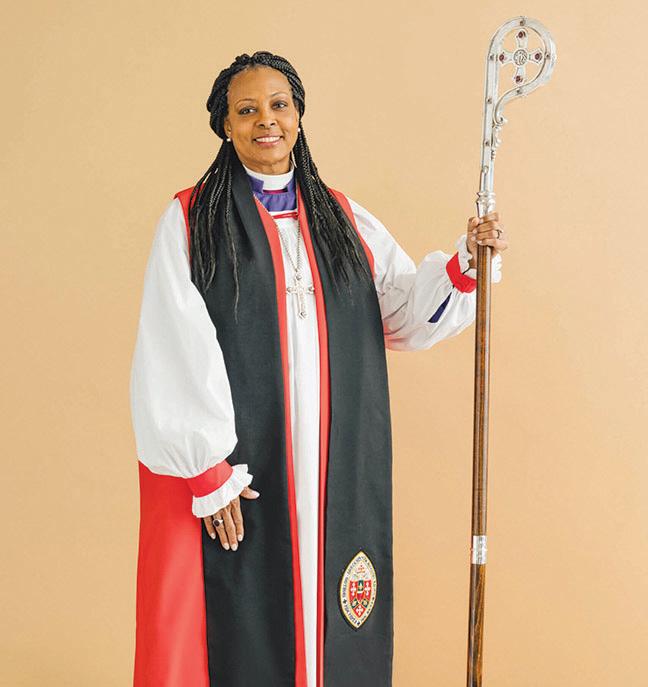

Adults around the country have been very vocal about youth crime and the uptick in car thefts and assaults perpetrated by juveniles. The city of Washington D.C. has not been left out of the trend, as information released by police reported 2023 as the deadliest year in a decade.
Teens in the District say the violence is impacting their day to day life. India McDougal, a senior at a high school east of the river, spoke on how a shooting near her school disrupted her morning routine.
“I live in Southeast,” said McDougal, referencing the section of the city where she resides. “I couldn’t even come to school because the streets were blocked off–and to be honest I didn’t want to.”
McDougal is just one of many young people struggling to recover after an act of violence in close proximity to their homes, schools or recreational areas.
The unpredictability of violence–specifically shootings by fellow young people– has left many high school students struggling as opportunities for social engagement decline.
“The violence is stopping kids from being able to be outside,” expressed Anaiyah Robinson, a 16- year-old athlete who also lives in the Southeast area of D.C.“People our age want to fight and kill one another. It’s stopping kids from having fun outside because they are scared for their life and their safety.”
Robinson told the AFRO, at this point, the act of walking around her part of town could be a fatal decision.
“Just the other day my mother told me a kid my age had just gotten shot with her friends in the neighborhood,” said the
Continued on D2
 By Sabreen Dawud Special to the AFRO
By Sabreen Dawud Special to the AFRO
Tears and applause filled the Cramton Auditorium as the Howard University College of Medicine hosted the 23rd Annual Long White Coat Ceremony on March 15 at 9:30 am.
The event commemorated Match Day, a national day in which medical students open an envelope that reveals where they will begin their residency programs.
According to the Association of American Medical Colleges, only about 5.7 percent of physicians in the United States identify as Black or African American.
Graduates of the Howard University College of Medicine gathered to be given their long white coats on stage in honor of their entrance into the medical field post-grad. Each student was also handed their Match Day envelope, which they opened at the conclusion of the ceremony.
The event opened with words from the masters of ceremony, Ameenat Akeeb and Kylar Wiltz. Their introduction was followed by a performance of the national anthem from Mikayla Harris and an invocation by Lawrence Garvin II.
R. Drew Professor of Surgery, Dr. Wayne A.I. Frederick, served as the keynote speaker of the ceremony. Frederick emphasized the importance of a physician’s ability to maintain humility and respect for others throughout their career.
“You should be trying to amplify other people’s humanity. You should everyday be looking for that opportunity to make somebody else’s existence that much better,” he said.
With a class of 97 graduates, the Cramton Auditorium seats were filled with family, friends and loved ones. Graduates such as Jada Watts, who will be training in emergency medicine at University of Chicago, described her emotions during the event.
“It was really a whirlwind of emotion— very powerful emotions. It felt so good to see so many Black doctors walking across the stage—people you’ve been sitting with at their worst and at their best,” said Watts. “We all overcame it,” she said, of the challenges faced through medical school.
“Coming to Howard was the best decision I ever made in my entire life. I knew I wanted a medical education that was not going to overlook the Black community.”
Greetings were provided by Dr. Andrea A. Hayes Dixon, dean of Howard University College of Medicine, and Xavier Becerra, U.S. secretary of Health and Human Services.
“We want Americans to recognize that this is what America should be and will look like in the future,” Becerra affirmed.
A class welcome was led by the President of the Howard University College of Medicine, Ixavion Wright, and Vice President of the Howard University College of Medicine, Kyla Bass.
Wright and Bass also awarded select residents, faculty and staff who were recognized for their outstanding work. These honorees included Dr. Dom Guelce, named “Outstanding Resident,” and Dr. Damires Fossett, who was celebrated as “Outstanding Faculty.” Shashika Cope and Leiza O’Neil were recognized as “Outstanding Staff.”
The 17th President of Howard University and Charles
“I opted for emergency medicine because it’s a field where patients often mirror the community. In the emergency department, we have the opportunity to provide care irrespective of individuals’ socioeconomic backgrounds,” she continued. “This inclusivity is particularly meaningful to me and serves as a driving force in my journey forward to tackling healthcare disparities.”
Other graduates such as Kyra Watson, who will be training in general surgery at Beth Israel Deaconess Medical Center in Boston, shared how the ceremony allowed her to reflect on the support she received as a student at Howard University College of Medicine.
“Seeing Black doctors—working with Black doctors day in and day out at Howard— it really keeps the fire underneath of you especially because they’re the ones who are really pushing you in that direction,” she shared. “If you’re struggling with something and you go to these doctors, they’ll sit down with you and they’ll chat with you, tell you about their experiences and help you along the way.”
Continued on D2
U.S. Senators hear the case for cutting workweek to 32 hours
By Torrence Banks Capital News ServiceIn 1955, Walter Reuther, head of what was then known as the United Automobile Workers (UAW), told a Senate hearing that coming technological advancements would make a four-day workweek possible.
That was the last Senate hearing on the subject for nearly 70 years. The Senate Health, Education, Labor and Pensions Committee finally ended the drought on March 14 as lawmakers debated legislation, sponsored by Sen. Bernie Sanders, I-Vermont, that would reduce the standard
“Despite an explosion in technology and a massive increase in worker productivity, nothing has changed.”
workweek to 32 hours without cutting employees’ pay.
“…Despite an explosion in technology and a massive increase in worker productivity, nothing has changed,” Sanders said. “Think about that– huge transitions we have seen in the economy. But in terms of the workweek, nothing has changed.”
Sanders said that the goal of his bill was to ensure that working-class citizens benefit from the revolutionary changes in the workplace over the past seven decades.
Introducing his measure March 13, Sanders said that
Continued on D2
Montgomery County Executive Marc Elrich signed amendments to the district’s Right of First Refusal (ROFR) law on March 1. The new iteration, Bill 38-23, will expedite the ROFR process, cap earnest money deposits to 5 percent and define deposit refund conditions.
County officials expect the bill to get properties in the hands of affordable housing developers in a more timely, cost-effective manner and protect renters from being displaced.
“Helping people stay in their homes and preserving affordable housing impacts our entire community because these are families who live in these apartments,” said Kate Stewart, vice president of the Montgomery County Council, during the signing ceremony. “If they’re faced with having to move, that means children being taken

out of their schools and having to go somewhere else, increased commute times for families and people leaving our community who are soccer coaches and heads of our neighborhood associations.”
Montgomery County first enacted its ROFR law
Continued on D2

Continued from D1
teen. “She wanted me to stay inside because it wasn’t safe.”
Robinson’s reluctance to spend time outdoors is
“For older students, regular participation in an afterschool program may also deter them from participating in risky behaviors, like drug use, and help them gain skills needed for college and careers.”
a glimpse at how violence impacts opportunities to further develop social skills and engage with peers.
City leaders are attempting to gain control of the situation through the implementation of a juvenile curfew pilot program which was activated by Mayor Muriel Bowser (D) in September 2023.

“The vast majority of our young people are doing the right thing – they are back in school, they are involved in extracurriculars, and in the evenings and at night, they are where they need to be – supervised and safe,” said Bowser, in a statement. “But we need that to be true for all of our young people, and if we have kids and teenagers who are not in safe situations, we need to connect with those families.”
While the enactment of the pilot program is still in its testing phase, young people are grappling with
all of the restrictions being placed on them in the midst of a highly emotional time.
“I think the saddest thing is seeing the school memorials for classmates who have died flowers and photos remembering the classmate are especially sad,” said Brittani Renae, a rising sophomore and also a student at H.D. Woodson.
When asked about a solution, Renae said she is looking toward her legislators.
“I think we need stricter gun laws,” she said. “So that young people do not have easy access to them.”

Continued from D1
As Black doctors who are entering the medical field, graduates such as Jasmine Walker, who will be training at Louisiana State University in Shreveport, La. for orthopedic surgery, and Bryttany McClendon, who will be training at George Washington University for obstetrics and gynecology in the nation’s capital, emphasized how their time at Howard University allowed them to hone in on their desire to center Black wellness.
“Coming to Howard was the best decision I ever made in my entire life. I knew I wanted a medical education that was not going to overlook the Black community,” Walker said.
Her sentiments were echoed by McClendon.
“I’m here for my people and I love that Howard instilled that in me that it’s okay to want to really help my community. That doesn’t mean I’m neglecting others, but it’s okay that I’m

focusing on making sure that my community is good because it’s been neglected historically for so long.”
As the Howard University College of Medicine honors the Class of 2024, the graduates continue to bask in the excitement of what is to come as they embark on their post-grad careers.
“Being a black doctor in medicine held immense significance for me, primarily because of the scarcity of physicians who resembled me in my upbringing. It
wasn’t until I entered a community like Howard, where numerous African American physicians serve as trailblazers, that I realized the profound importance of representation,” said Watts. “In environments where underlying social determinants significantly impact disease prevalence, having diverse representation is crucial. Studies have shown that enhancing diversity in the medical field correlates with improved patient outcomes.”

Continued from D1
U.S. workers had become over 400 percent more productive since the 1940s. Even so, people now are working longer hours at lower wages, he said.
UAW President Shawn Fain said that automation now allows a single worker to do what used to require 12 workers. Companies’ obsession with ensuring productivity every second of the day has come at the cost of workers, he said.
“When people reach the end of their lives they never say I wish I’d make more money,” Fain told senators. “What they wish for is they wish they had more time. There was a time when this phenomenon was supposed to lead to workers getting our time back, getting some of their lives back.”
Forty percent of Americans work at least 50 hours a week, and 18 percent of today’s workforce works more than 60 hours a week, according to research cited in Sanders’ statement.
A 2019 study published by the International Journal of Environmental Research and Public Health found that working more than 60 hours a week led to a decline in workers’ mental health compared to those who worked standard hours.
“It causes an increase in cortisol levels, which lead to heart disease, cancers, strokes,” Fain said about working extended hours during the week. “But given all those facts as someone is lucky enough to get to retire, typically when they weren’t willing to work themselves to death their entire life, they face knee replacements, hip replacements, shoulder surgeries, and the rest of their lives, figuring out how they’re going to survive.”

A four-hour workweek is being considered by members of Congress in the Senate Health, Education, Labor and Pensions Committee.
But Liberty Vittert, a data science professor at the Olin Business School at Washington University in St. Louis, said that studies suggesting that working fewer hours leads to happiness are flawed. Vittert said that many of the studies showing an increase in happiness find the effects are short-term and that long-term studies show that happiness does not increase over time.
In addition, only companies that can cut out extra meetings and coffee breaks during the day participate in these studies, excluding more than 70 percent of the U.S. job economy, Vittert said.
“If you want to see those same employees really stressed out, just see what happens when their employers lay them off to hire part-time workers instead, or have to close
Continued from D1
in 1980 with the goal of maintaining more affordable housing and combatting tenant displacement. Under ROFR, the county, Housing Opportunities Commission or any certified tenant organization—in that order— must be given the opportunity to purchase rental properties before the owner can sell to another buyer.
Before Bill 38-23, the county needed to pay the full price for multifamily rental properties, which oftentimes amounts to tens of millions of dollars. Then, it was permitted to sell the property to affordable housing organizations after acquisition. County officials said the process increased capital costs and wasted funding and personnel.
“We’ve had Right of First Refusal for a long time. It was good, but it had limitations on it. It kept us from being able to acquire some property and being able to work with partners we want to work with,” said Elrich at the signing. “It required the county to
hold a lot more money for settlements, which is a real impediment because you have to have a large pool of money just sitting there.”
“This changes the process, and I am really excited about the ability to improve the Right of First Refusal law because it’s
their doors because they cannot make enough revenue,” Vittert said.
She also pointed out that older workers who cannot complete the same amount of work in fewer hours are also at a disadvantage.
Sen. Bill Cassidy of Louisiana, the ranking Republican on the panel, emphasized that there is no law preventing companies from already enacting a 32-hour workweek and that federal intervention is not necessary.
“Let’s give flexibility to workers and employers – don’t have government come in and intervene,” said Roger King, senior labor and employment counsel at the HR Policy Association.
This article was originally published by Capital News Service.
of rental properties to affordable housing developers without having to temporarily own them.
“We believe, starting today, the improved Right of First Refusal Program will help more Montgomery County residents and more practitioners to achieve excellent results for affordable housing preservation and tenant protections for years to come.”
critical if we are going to preserve affordable housing in the County,” he added.
From 2015 to 2023, Montgomery County collected more than 300 ROFR notices. It exercised the right just 12 times due to these limiting factors.
Now, the county can employ ROFR to directly assign the purchase
“We believe, starting today, the improved Right of First Refusal Program will help more Montgomery County residents and more practitioners to achieve excellent results for affordable housing preservation and tenant protections for years to come,” said Melissa Bondi, policy director for Enterprise Community Development.
Megan Sayles is a Report For America Corps member.
To close out Black History Month, the Mt. Moriah Baptist Church paid tribute to their elder members of the congregation who have invested their time and service to the church that are between the ages of 90 to 99 on Feb. 29.
“It brought an energy to the worship experience I haven’t experienced for years and it brought all generations together,” said Lucious M. Dalton, pastor of Mt. Moriah for 24 years. “We made sure all the youth participated so they can engage with people who had such an impact on the church; they taught Sunday school, youth church, were peoples’ recommendations and were peoples’ first jobs. It’s amazing to look back and see how the 18 blessed the church. The youth were mesmerized.”
Hosted by Deacon Mae Frances Franzier, the church’s Hidden Figures chairperson, Mt. Moriah celebrated eighteen elders; Doris Williams, 90, Myra King, 90, 91-year-old Doreane Smith, Albertha Smith and Ralph Battle, church trustee emerita Vivian Smith, 92, Emma Roberts, 92, James Jackson, 93, Faye Jackson, 93, Nancy Drakeford, 93, Jacqueline C. Howell, 94, trustee Williard C. Poteat, 94, Helen Hasty, 95, Mamie Underwood, 96, Dorothy Yiare, 96, and deaconess emerita Ruth Harris, 99.
In 2020, amidst sorting through documents, thethen Deaconess Mae Frances was cleaning up paperwork and found different members of the church’s birthdays, specifically those over the age of 90 or turning 90. She made note of it and kept track of it for four years to find a way to honor these individuals.
Once she was asked this year to work on the Black History Month program at Mt. Moriah, she realized this was her chance. She was overjoyed, structured the program, gathered her list and presented it to the
church program. Pastor Dalton approved it and, by the fourth Sunday of February, Deacon Frances was able to honor her mother Drakeford along with 17 other Hidden
“It brought an energy to the worship experience I haven’t experienced for years and it brought all generations together. We made sure all the youth participated so they can engage with people who had such an impact on the church. “
Figures of Mt. Moriah. This event was held as a Black history lesson for individuals of the church. Even within the 18 honorees, some they didn’t know one another was 90 and older.
There was a roundtable discussion held for the Hidden Figures where they were interviewed further by Deacon Frances. Some Hidden Figures had been at the church most of their lives such as Hasty, 95, who stated she had been at Mt. Moriah since she was 5 years old. Battle taught Sunday school to Deacon Frances and her children.
Dalton continued and emphasized how he had known the Hidden Figure for all his 24 years as pastor of the church and always encouraged him over the years. He called them “substantial members of the church.”
King, 90, a member of Mt. Moriah, for 78 years, was pleased with her recognition. “It was a


wonderful way to honor senior citizens who honor you. It was great being honored by people you know and inside the church.”
King recalled her childhood and how she wanted to be a junior usher. As an adult, she was a part of the drama ministry that put on performances and plays.
“It taught the messages the preachers were teaching but through a different venue, something for everyone,” King stated. She also said that the performances taught people how to be of service through modeling and physical examples.
King said she’s grateful for the honor and hopes to continue to work in service under the church. She wants to offer growth and wisdom to the youth and express the value of community and her overall love for God.
Trustee Vivian Smith, 92, a member of Mt. Moriah for 64 years, stated she was grateful.
“I’m grateful God has allowed me to be 92 years old and proud to be among the 18 of us who reached 90. I’m blessed ‘cause I’m old but I have not seen the righteous forsaken,” she said in reference to the Psalm 37:25 verse, a verse that Pastor Dalton used during the ceremony.
Smith also stated she was appreciative of Deacon Frances for putting the event together. “I’m beyond proud and grateful of Mae Frances for putting this together and having the vision to recognize us.”
Smith understands the process of putting together church events due to her past experiences. Aside from being a trustee, some of her past roles within the church include being a Sunday teacher, a member of the fundraising arm of the church, and participating in hospital ministry.
Smith explained that she had been a part of almost every committee of the church and currently
my granddaughters were baptized, four have gotten married, [a] great grand has been baptized and married, and [a] greatgreat grand are getting baptized and marriedall within Mt. Moriah,” Drakeford said.
“I just feel blessed because God is letting me experience all that and I feel happy and loved especially by my daughter because she built this event.”
During the ceremony, The Hidden Figures honorees were asked to provide words of wisdom to the youth.
working on more ways to fundraise.
“We’re trying to raise money for renovations for the church and for scholarships,” she said. “I also have been working to reclaim inactive members and connect with family of church members who have passed.”
Drakeford, 93, has been a member for a little more than 55 years. When she came to Washington D.C., she found Mt. Moriah when she was looking for a Sunday school for her daughter. The church was within walking distance. Her family has actively been involved with the church for generations. “Four of
Some collectively agreed and emphasized being of service to others. “In your heart, see how you can be of service to others and within your behavior be of service to others,” stated King.
Another word of advice was from Smith, whose 77-year church service started when she was 14, stated “Be kind, be thankful, put your trust in God and be great.” Battle wanted to highlight being on your own and finding support within religion, “Tell the youth, don’t lean on their own strength and understanding. Every morning when you wake up thank God for another day, let Your will be done
as it will in heaven. Allow yourself to be dependent on God.” Wells, 91, who has been a member of the church for 61 years, reminded everyone, “Be patient and look to your mother and father and stay in school. We have to work with youth because they are our future. God loves each of us and we have to work together.”
Mt. Moriah is a multigenerational church with their largest population being middleaged adults. Seniors and youth tie for second according to Pastor Dalton. He expressed that people who went to the church stay here. Folks may leave for school, work or other reasons but tend to return. He also hires youth to “keep a growing family.”
In a way to connect the elders and the younger generations, Mt. Moriah holds seminars such as their technology workshops where elders bring their cell phones, laptops, and other items or questions to youth as they work together to solve issues and understand the product. Pastor Dalton believes that churches are a space for community and is dedicated to making it a space that remains that way.


Civil rights leaders, publishers and journalists from across the nation came together at the National Press Club on March 15 to celebrate Black Press Week.
Congressman Jim Clyburn (D-SC-05) shared remarks via video and National Newspaper Publishers Association President and CEO Dr. Benjamin F. Chavis Jr. presented a powerful State of the Black Press address.
The audience was moved by Chavis’ words, imploring members of the Black Press to do all they can to encourage Black voters in the current election year.
Black Press Week 2024 had a theme of, “Getting Out the Black Vote Across America.” Special guests at the event included Rodericka Applewaithe, director of Black Media at the White House and Dr. Benjamin Talton, director of the Moorland-Spingarn Research Center at Howard University.



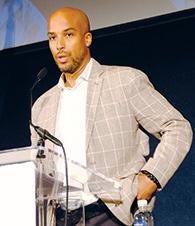
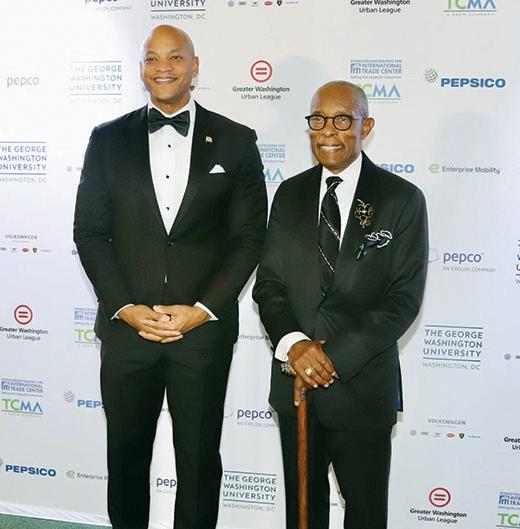





 By Ashleigh Fields AFRO Assistant Editor afields@afro.com
By Ashleigh Fields AFRO Assistant Editor afields@afro.com

The Greater Washington Urban League hosted the Whitney M. Young Jr. Gala to uplift local leaders, present scholarships and celebrate their president, George H. Lambert Jr. on March 15. Lambert has
been with the organization for 10 years. The event gathered esteemed professionals in the Ronald Reagan Building and International Trade Center to cultivate legacy through education and conversation. At the annual gala, they honored the nation’s only Black governor, Gov. Wes Moore,

